#i think i've posted before about how interesting i find the contrast between 'You really are amazing!' from Teru
Explore tagged Tumblr posts
Note
Teru is so misunderstood. I saw someone say that he recommended Mob buy the ugly shirt because he’s a bully and wanted to take Mob down a peg. He just has incredibly bizarre fashion sense and has giant Mob-specific blinders! Get Teru away from them ;-;
Yeah, I've seen that take mentioned before and it's such a baffling misreading! It also overlooks what's actually interesting about the whole thing with Teru and the monkey shirt, which is that while Teru is being completely honest in his assessment, the combination of his hero-worship of Mob and his inability to conceptualize a perspective on the world that differs from his own means that his advice is still absolutely unreliable.
It's different from Reigen and Ritsu in the flashbacks, who are being dishonest to Mob because they don't want to hurt his feelings. It's interesting to me that when Mob talks to Teru about his thoughts on popularity, he's a lot quicker to use qualifiers and second-guess his own perception than he is in other conversations: he knows that Teru's popular, and he views him as an authority (and he doesn't understand how much Teru adores him and how that warps his perspective). Mob's almost looking for someone to be a voice of reason, but when Teru tells him that no, really, he is popular, the girls are looking at him because he's so handsome and cool and also this is a great shirt, Mob takes it as confirmation and doubles down.
I think this is really notable not just for what it says about Teru's character, but because that kind of unexamined, mindless devotion is exactly what Dimple is trying to cultivate in his followers. It's a sort of "honesty" that means nothing because they aren't able to see the object of their affection as a real, complicated person with flaws, which can feel nice in the moment but is absolutely toxic long-term, both because it prevents genuine connection and because it can enable bad or delusional behavior. That's why it's so important that Dimple realizes that he doesn't actually want that; he wants his friendship with Mob where they're actually honest with each other, including pointing out when the other one has done something out of line. And that's why it's so important that eventually, in Confession, Teru realizes the same thing.
#mp100#conversations#mob meta#i think i've posted before about how interesting i find the contrast between 'You really are amazing!' from Teru#which is him breaking out of the brainwashing but also reinforcing the extent to which he puts Mob on a pedestal#vs 'You really are amazing' from DIMPLE at the end#which is about admiring Mob as a whole messy fallible person#it's good! i think about it a normal amount!
97 notes
·
View notes
Note
Hello, Dema here!
First off—I have fallen desperately in love with your artworks. You have a very particular style, strong and fluid all the same, and I can't help but admire the way you draw and how you approach character design.
And talking about character design...
I saw your post about Zuko's bold design in S1 when compared to what we got in S3 and—as much as I love S3-Zuko—I completely agree with you. Something I've always loved about Zuko in S1 is just how striking he was, how much of a presence he had, even when he was being tossed around by a twelve-year-old. That being said, I love Zuko, I love him in armor and pointy shoes and with a ponytail, and I loved your alternative design for him.
What do you think about his S2 character design? How does it flow with the story beats and his overall character arc? Much has been said about the Hair-Growth-Means-Character-Growth (and I find it interesting, also, that he cut his hair again before joining the Gaang), but I'd like to know your opinion on how that translates to character design and how the decisions made in the show could be either good or bad in that regard.
Sorry about the long ask! I've just been thinking about this a lot, lately, and would like to know what you think. Hope you have a good day ❤️
AAAA Dema hii!!! I'm so happy I got a message from you, I didn't expect it!!
I'm super glad to hear, I'll wear it as a badge of honour and I must tell you that I also love your art, you wonderfully do volume and the shading done through a contrast of sharp and soft areas! Super solid anatomy too and I'd be lying if I said I didn't look up to your art!
Yess the character designs in the show actually are rather strong, I like a good balance between memorable and functional. Zuko is just *chef kiss* but, considering just how many appearance changes he goes through, some are bound to be weaker than the starting one. That said, I'm gonna go through a few of his S2 looks and make this reply long, ha!
The starting one when he ends up huddling with uncle Iroh with other poor refugees, fits extremely well for the narrative at the moment. It's actually one of my least liked looks for him, and that's great!! It's precisely how it should be, because he's also arguably at one of his two lowest moral points in the story - he basically lost almost all hope, no clear goal, nothing to fight for, he's desperate precisely because of the lack of orientation and thus his morals degrade and sink veeery low. He gets on my nerves so goddamn much in this period LMAO I want to beat him up, he looks like a recovering drug addict... annoying, entitled whiny jerk stealing food and anything shiny for his uncle, but even then he just does not cross the moral event horizon. Excellent characterization. He just looks atrocious and it's great because it fits this low point.

Next he gets the standard boyish square of a hair, no notes here...
But theeeen, he arrives at one of my favourite looks of his, and it's not just because the clothes fit him very nicely (I've seen fandom say they look too big for him which, maybe?? But it doesn't look like he's swimming in them to me) And a thing I've noticed which, maybe it was just an accident on design part but I'm not sure considering they colour coded the entire cave scene; in this part his clothes match the shape of Katara's, first one in bottom then the one in top. The collar is the same haf-circle design but I don't know, maybe there was a limited pool of clothes designs guide which they cycled through. Or, he really is meant to come close but miss Katara by a beat, like sine and cosine chasing each other.

But besides this outfit fitting the inconspicuous Earth Kingdom customer service persona, it also (perhaps inadvertently) does this VERY cool thing:

It makes his shape look closed off and guarded, supposedly non-threatening. It's most visible in his fight against Jet, whose shape is open and goes in many directions like an aggressive star. But then look at what Zuko's shape does:

When he attacks, it opens up to reveal the hidden aspect, again the aggressive star shape shows up! The same thing happens in "Zuko alone" episode but I think it's most clearly visible in this fight against Jet because here he has a direct contrast and comparing with Jet. I think this is an example where the outfit, whose similar design exists irl, overlaps with a great visual metaphor and enhances the narrative at that moment in story. He's still that combative firebender but he has to keep that aspect concealed most of the time. Plus it just looks badass as hell!!

Animators really knocked it out of the park with many frames. I think Jun was too early and missed his better hairstyle, but Katara was just in time.
I agree it's super funny how his hair in the Beach is awfully long, covers his face to an uncomfortable degree and then he apparently shortens it before joining the Gaang, insane behaviour Truly an "I'm so angry and depressed I won't show my face nor be capable of seeing anything because there's nothing nice to see in my life" look...
I guess all his appearances in S2 cover his mental states, but only one of them is extremely Extra (the tea server, doesn't even take the apron off and goes to fight) and I don't see any spot where a similar tier design could be shoved in, narratively speaking. So all in all, S2 did as much as S2 could have. More tea server arc please though, the Guru episode really feels like it skipped 800 km of plot and everything that happened in it is so crammed and pretty sus in terms of character behaviour.
#Thank you for the ask!!#I just rambled and I'm sure I didn't cover everything like I was supposed to#zuko#atla designs analysis#my art
165 notes
·
View notes
Note
I actually think Luke is serious about A. That age gap is typically what men marry these days. I think he's crazy about her and was taking it slow after a long term break up before going official. That shows intention, planning, and wanting her. I wouldn't be surprised the official IG couple post is coming soon.
I'm just upset that they took it this far with promo. Tom and Z were meeting each other's family outside of work early on, so to say you are officially brining him to meet the fame was a bit much. Closing your eyes when she touches your face? Grade A acting. I hate that it makes me believe he was never attracted to an amazing woman like Nicola. I feel dumb for falling for it all. I hope Nicola finds a handsome guy who will love her proudly.
that's a really interesting take tbh! ive actually never considered he was serious about her in the sense of marrying - but of course this is purely based off the vibes I get and is entirely my own view.
one of the reasons i say this is because luke doesn't seem too inclined to keep a completely friendly distance between himself and nic - i heard that the QC leads india and corey were shipped really hard by fans as well and he had a gf during the whole press run - and towards the end india and corey started posing separately on carpets (i.e. no touching, no friendly hand around shoulder even during photos etc) because they wanted to emphasise that they were really just friends.
luke in contrast seems to have no qualms about blurring lines - and one of the reasons the more rabid fans kept insulting Antonia was a direct result of the fact that he kept stating his "single" status to press. I think he could have helped Antonia avoid a lot of the flak she drew by just stating that he's seeing someone. but maybe he felt it would draw even more attention to his private life and her? idk. i don't want to puzzle over his motivations because I don't believe they are too complex - I've said this many times before and I'll keep saying it - no matter how good a man seems (and I do believe Luke is very good and sweet), trying to justify anything they do is still a sure path to disappointment.
more importantly: please don't feel dumb for falling for the hope that nic and luke could be together! i really don't think they were being deliberately disingenuous - i actually think the opposite - i think they themselves are often confused about what they really are and it's just easier to define it as being great friends. it's strange but i get the feeling that they see each other as a source of potential - it's simultaneously impossible and also the easiest thing in the world for them to envision a reality where they're together - there just seems to be many barriers to it happening for real. they're comfortable living in the liminal space between great friendship and great romantic love - it definitely explains why nic said she doesn't have a relationship in her life that's anything close to what she has with luke. I think there just needs to be a decisive push for them to ever move out of this grey area. it'll have to be something massive for it to ever happen... and it's not something I hold out hope for (again, just to avoid disappointment!)
this got really long; I wish nic and luke all the best and I think they have something very special with each other. I think life has many many stops along the way and I don't think luke has found a final stop in his romantic journey with antonia - they are both very young and they don't have the vibe of "together forever" couples - if they did (since luke is such a big believer in love at first sight) - he'd have laid down a commitment a lot sooner.
again I want to emphasise that this is all MY POV - it's the vibe I get. I'm WELL AWARE I don't know these people irl. There's always criticism of how parasocial fandom and stan behaviour are but I think most fans - myself included - are very conscious of the fact that the way we perceive and interact with celebs is completely one sided. I'm also not a psychic or clairvoyant or anything of the sort. i just strangely feel a lot of things all the time and ive never been chill a day in my life 😂
sending you lots of good feelings and healing - I feel your hurt and unease and disappointment because I feel the same, but it gets easier to accept with each day that passes.
57 notes
·
View notes
Text
On Tee's Lonely Grief
I've seen people talk about New's and Phee's grief, Pimpa's grief but the gang has never been considered that much on account of their guilt. This episode, however, brings attention to that. Especially in Tee's case. Especially in the scene when he finds Non dead.
And I have to say, I fucking love this scene. So I'm here to tell you why.
PS: For the sake of this post, unlike what's normally my policy, the pictures used will not be edited in any way, shape or form unless stated otherwise. I think it would be taking creative liberties with the photography and it would diminish the validity of my analysis.
So:
Tee finds Non's body upstairs with his uncle's goons (dressed in entirely black outfits which obviously invoke death) very suspiciously looming over it.

So he does what capable and strong Tee, who has to support himself and his father and his uncle's business and now Non (as we saw very clearly this episode) would do: He lashes out. He demands answers. He threatens people. Because that's how he learned to solve his issues.
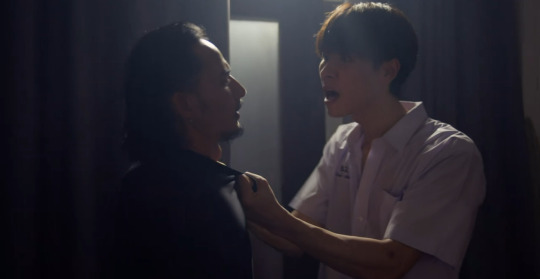
Yet he gets mostly silence. Arguably, the same exact silence he initially offers the 2 other people grieving Non this episode: New & Phee.
And so he argues with his uncle, makes accusations, mirrors New in the present moment so well it's uncanny.

And then he's alone. Everyone leaves, including Non's body. And now there's no one to perform that idea of a strong ruthless guy to. Now it's just Tee. And the contrast between the act of Tee and Tee is remarkable: one moment he's cold, and the other moment he's completely broken.
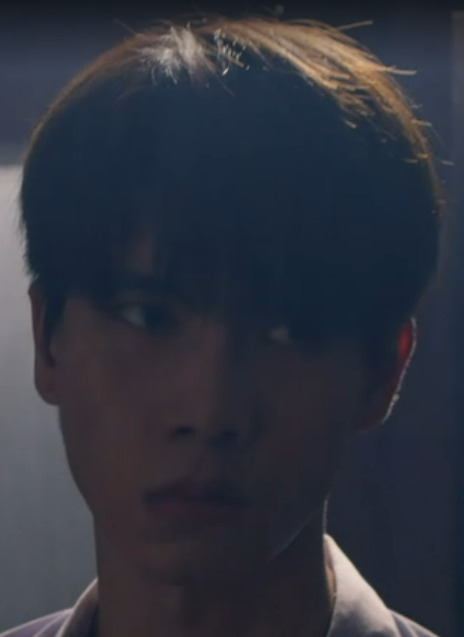
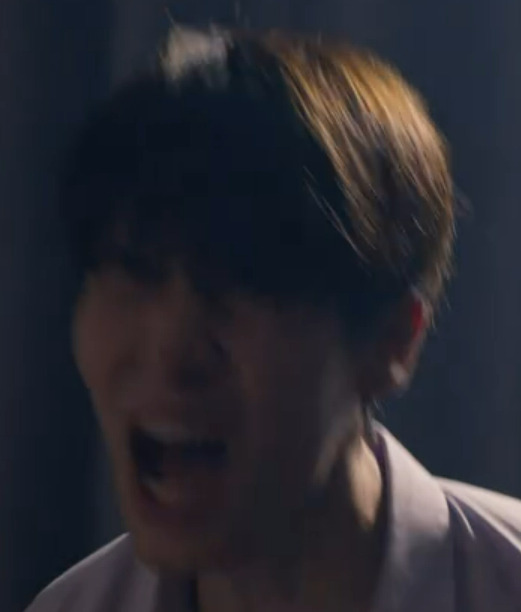
So he screams, at the top of his lungs, which is interesting. Because we do see Tee cry but not much. Tee's just not a person who cries. Which, besides being very relatable, is also terrible. Why? Because crying relieves you. It helps you cope, it releases the tension from you, at least a bit. Tee not crying here means this (Non dying), unlike the guilt of what happened before with him and the gang bullying Non

(something he is allowed to shed at least a single poetic tear about) Is a burden he can't be relieved of. At least, not at that moment.

So we watch as Tee screams helplessly. And the environment is so telling. GOD, I FUCKING LOVE THIS SHOW
There's an empty space. Virtually nothing is there with Tee. Because, of course, he's alone in the room, we know this, but he's also alone.
No one else knows this story like Tee does. No one else has been with Non when he was a creative student trying to make a film, when there was life to him in all senses of the word and also saw his dead, lifeless body. No one else has been the cause for both Non's problems and Non's death. No one has liked Non as a friend and cared for him and watched him die without being able to do anything about it. No one in Tee's life knows what he's going through, what it feels like. No one in Tee's life is able to share his grief. And he can't escape it either.
You see that weird ass mirror there? Why is it there? There are curtains around it. But it's not a window. That's odd. But while it makes no sense decoration/architectural-wise, it makes so much sense from the point of view of symbolism.
There's no escape. Even when it really feels like there should be. Because Tee, the guy with all the solutions, should be able to find a solution, shouldn't he? Besides... We come to care so much for him and for Non... So how come there's no solution? Because, we, like these teens do to adults, naively trust the narrative. Of course, there's no solution. We all knew this from the start. We're only here because of this: Non is dead.
So, instead of a way out, a hope for something better than what's going on in that room, we get just more of it. Tee and we alike, have no escape. We're both forced to face that scene, forced to accept it. And Tee, if he dares look for that way out, will only have to face himself.
But interestingly, he never does. Tee never looks at the mirror on the wall. He doesn't even acknowledge it. Which, of course, might be a reflection (pun intended) of how he tries to pass the blame of Non's death to his uncle.
He repeatedly claims he didn't know what would happen, that he wouldn't have brought Non back if he did but... Is that true? As Perth's character (BOMBASTIC SIDE EYE, btw) says:
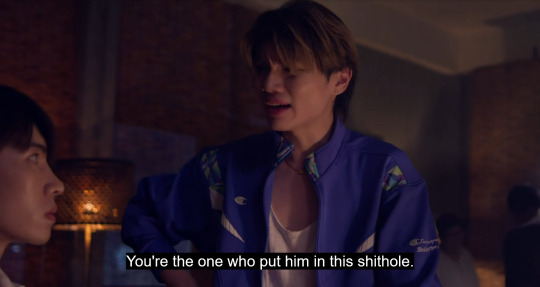
"You already knew, right?" Because, let's face it, it was obvious. Things could only go poorly for Non if Uncle Joe got his claws on him. Tee had to know that wouldn't end well.
So this scene also tells us that, despite deep down his immense amount of guilt telling him he is guilty of Non's death, Tee doesn't want to acknowledge it. He maintains that position, in fact, nearly all the way until the end of episode Ep.11. where he slightly changes his narrative.

He never planned to.
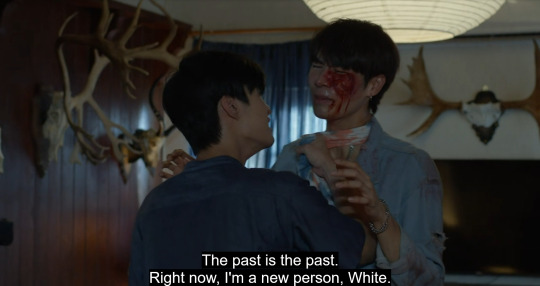
Right now, he's a new person. One that would not make the same mistakes as in the past but that, despite the changes, is inevitably the one who somewhere in the past did make them.
But back to the scene.
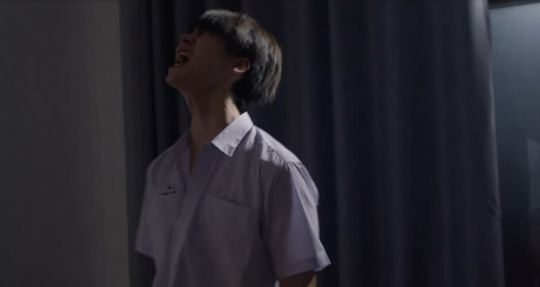
Tee is framed right in front of the blueish-grey curtains and we all know what that means, I do not need to cite the ancient scrolls. But I wanna add that grey is also:
a colour associated with sadness;
seen as a colour of death, as it is literally in greyscale, hence colourless, lifeless AND because it can also be interpreted as a mix of white and black, both of which are mourning clothes colours, depending on the culture;
a reflection of Tee's grey morality because, naturally, while we understand Tee's motivations and background, he did some pretty fucked up things that his good intentions and unhelpful help attempts cannot erase.
And then Tee finds a small paper, written by Non (in vivid blue, properly highlighting not only Non's depression but also Tee's).
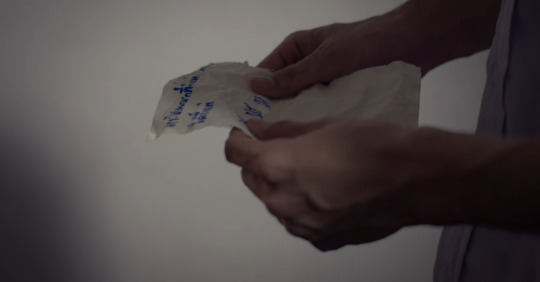
And the paper reads: "I'm gonna get out of this place. I'm not a loser." And it hits him even further because Non (at least in Tee's vision, I'll leave Non's death up for debate, I'm sure people will have theories) wanted so bad to be victorious once, to succeed just once. He wanted to get a chance to live normally and it didn't happen.
This, of course, ends up shaping Tee's own path, as he meets White and gets a chance to do things "right" and as he becomes this "new person" and gets away from his uncle. But, in that moment, none of that is relevant because it hasn't happened and Tee cannot know it will, he can only know, with written proof, that he failed. And now Non's dead.
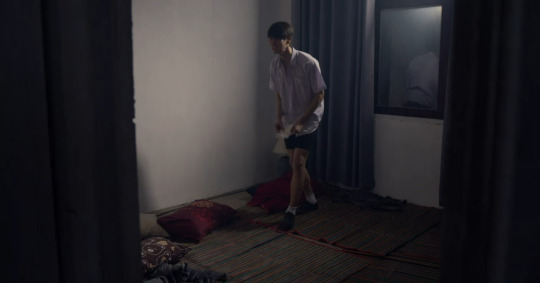
And so, in the last part of this scene, we see a more zoomed-out shot. And Tee's still alone but now we have a more clear vision of just how tiny that space is. And how he's nearly taller than the frame. How his grief is bigger than the space in which it was brought to him. But also how the weight of it, represented by the walls, is nearly crushing him. Another gigantic, and perhaps the biggest of all, responsibility on Tee's shoulders.
Furthermore, as @shannankle has marvellously described and explained in this post about sex scene framing, the framing gives us a level 3 visual gaze which is used to remind us as the audience of just how intimate and profoundly shaping of Tee this moment is: we are not supposed to be here, this moment is Tee's and Tee's alone. Because, of course, he is alone. In all senses. The access we're getting is nearly forbidden. Even to the other characters. Because they don't get to see it, they only hear about it (or we assume they do).
And, to top it all off, the cherry on top of this great scene: all of this happens while Tee is wearing his school uniform. Because, of course, it had to. Because we need to be reminded: this is a teenager. Tee, who's mourning his dead friend whose corpse he just saw and whose death is largely his fault is just a teenager.
#So yes#I might hate that Phee is apparently omniscient#but BY THE UNIVERSE AND ALL OF US IN IT#do I LOVE the care and thought put into the details of this story!!!#it's so good!!#dff#dff the series#dead friend forever the series#dead friend forever#dff meta#dead friend forever meta#dead friend forever ther series meta#dff the series meta#dff tee#tee dff#dead friend forever tee#tee dead friend forever#dff the series tee#tee dff the series
109 notes
·
View notes
Note
What's your most hated Bummy scene?? I'll tell you mine. It has to be the kiss in the hospital lobby and buck getting outed because of his soot covered mouth. Never hated a 911 episode more than that. I love Buck. They just made a mockery out of him by that scene.
Where do I even start.. Couldn't agree more about the soot scene, although I'm more angry at the writers about that one than I am at Tommy, given how important it was to Buck that he came out to Eddie and Maddie on his own terms and how much weight he gave those interactions I feel like even though that one was supposed to be a cute little "hehe look this is very Buck coded", it fell short in that I would've liked everyone else at the 118 to find out in a more heartfelt way ya know??
In terms of my least favourite(s), the whole arc with billy boils was a very interesting play by the writers in that it highlighted the differences between Eddie and Tommy in a meaningful way. On one hand, Eddie, who has presumably been with Buck in the hospital the whole time he was being treated for his boils, is used to Buck's hyperfixations and Wiki deep dives, and finds them wholesome and cute. I reblogged a post a little bit ago where Buck told Maddie about how her and Chim always finish each others sentences and that theyre basically already dating, and then contrasted with how Eddie was finishing Buck's sentences in that scene. Buddie fanatic aside (I will admit im obsessed with these two idiots), THIS is the kind of domesticity I've always wanted for Buck's partners, where they acknowledge and love those little moments that he has.

Now lets go ahead and look at Tommy's side of this whole thing: Tommy's reaction to seeing the boils + how he treated and viewed Buck's obsession as exactly that, an obsession + the graveyard scene??? You can break it down into "oh well Buddie have known eachother since s2, Bummy have been together 6 months", but from my perspective the fact that Buck didn't even realise Tommy didn't like women until their 6 month anniversary (???) just goes to show that they don't really know that much about one another. Tommy was completely right in the breakup scene; he was definitely not Buck's last, and the poor guy is definitely in need of some self exploration (#letbuckfuck) before I'd be happy to see Buddie honestly (and thats not even considering the work that needs to be done on Eddie, my guy is going through it rn with Chris). Anyway; I just read this amazing fic by playinginthundestorms (on ao3) and I think the way they described Tommy (slightly Tommy bashing), was overall how I imagine he sees Buck. It never really felt like Tommy was fond of these little things Buck does in the way that Eddie (and the rest of the 118) are, more seeing him as childish or juvenile as the fic described. And it makes sense, tommy is older than Buck. A whole other can of worms and probably the icing on the cake for me was the Abby debacle, the misogyny really showed??? like man you have not changed since Hen my lord. Calling Abby out for running off with some "himbo half her age" was wild considering thats what he is currently doing with Buck? Especially with all the shit she had to go through with her mum at the time? Like what on earth is your excuse Temu? Anyway, to cut a long rant short, I actually have given you like 50 reasons, but i definitely think that Tommy was a well placed plot device and it was obvious from the start. Also, ABC could've chosen ANYONE to be Buck's first experience with a man and they were like yep lets use the racist homophobe from Chim and Hen begins cos why not?! I probably would've had a far less negative opinion of him if he was a fresh character, and I think that's on purpose, I think it would be really interesting if they go down the road of hen and chim sharing their experiences with Tommy now that they've broken up, and that they didn't say anything cos they just wanted Buck to be happy. Definitely after that heartfelt scene with Hen especially, that I didn't get cos of that bloody soot scene.
38 notes
·
View notes
Text
Arknights lore continues to be insane
Babel event spoilers below . . .
What a mess. Finding out that the Originium project is human instrumentality via contagious protomatter is interesting. What threat was so horribly insurmountable to Doctor's people that the best solution they had was to create a grey goo scenario that also subsumes everyone into a simulated reality? It does explain the alternate version of events glimpsed through the dialogue in Kal'tsit's Remnant skin, as Originium has become more successful at its original purpose in that outcome.
This means Dorothy unwittingly reinvented a crude imitation of Originium via the transmitter fluid, which so far is only mildly less terrifying as I don't think it's been established to be capable of self-replicating. My favorite Warcrimes Jerboa has been made to look even more insane by an event she has nothing to do with, because holy shit girl.
Speaking of alternate means of making the many into one, is Terra operating under some passive rule of carcinization but for human instrumentality? Between Originium, Dorothy's transmitter and the Seaborn we're already at three different methods/interpretations of the same goal that are/were trying to unite all people on a fundamental level.
All those "if I met original Doctor I would be filled with the strength needed to beat them to death with my bare hands" types of posts are right. It's not that this fucker was unempathetic, they actually cared for people deeply, it's that they did care but ultimately twisted that caring towards serving their original goals. "It's fucked up that people are suffering right now, but I can end all suffering by having Originium consume the universe and integrate everyone into the Minecraft server that is running on it."
Fuck, every time we're shown Kazdel culture it's fucking bleak. The only way to be notable as a Sarkaz is to be a successful mercenary, and they perpetuate a habit of using toxic-masculinity bravado to cover up and downplay the fact that they were deprived of education. Literacy and just general wider knowledge of the world is a luxury to have in Kazdel.
This event has really made it feel like the Victoria arc is what the current writers want people to consider to be Arknights' real main story. The Lungmen arc can't be outright dismissed because of how much it's used to characterize so much of the main cast, but I do get the impression it's something that we're being further encouraged not to linger on. I get the sentiment. Those first few main story chapters are a rough read, made even rougher depending on when you started playing and what event stories you can contrast against it. I talk pretty regularly about arknights with my sister who started playing just before Lone Trail originally dropped, and comparing that writing against the Lungmen arc is an abyssal power gap that does make the main story harder to trudge through.
That said I do wish Babel was positioned better from a narrative perspective. I've spent the Victoria arc up to this point sitting on a lot of questions of "who the fuck is this guy" that were only answered just now. I'd probably have appreciated what's going on with Theresis, Theresa, Manfred and Ascalon a lot more in my original reading if I had been given the context for the baggage between them and why they're all this way.
33 notes
·
View notes
Text
Time for that unhinged Geryon essay I promised:
I've posted about it before, but now with the finale out and with the final confrontation between Hotaro and Geryon, I'm just thinking again about the thematic aspects of Geryon once again. And how he and his obsession with turning the world into gold is meant to symbolize wanting things to stay the same.
While Hotaro and the others wish to move things forward and change the future.
And that is one of the main themes of this show: To push forwards, reach your dreams, and change the future. And how you can only do both of those things by moving forward.
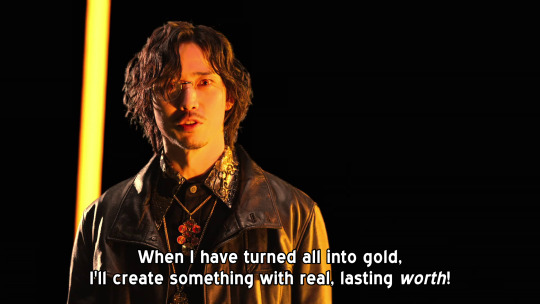
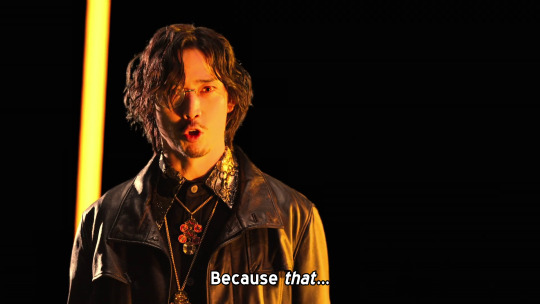
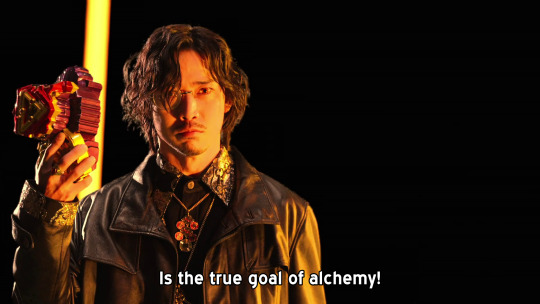
Geryon talks about turning worthless things into gold "is the true goal of alchemy". While with Hotaro, Rinne, and others being an alchemist is about using alchemy to bring happiness into the world. Which is a vastly different goal than the original historic reason behind the origin of alchemy.
To Geryon, Hotaro's dream, and the concept of having dreams itself is a pointless endeavor. As well as a sign of weakness. What really matters to him is to create something with what he thinks has real "worth", by using what is one of the original purposes of alchemy and probably the most well known: turning base metals into gold.
Also gold is classified as a noble metal. Which is interesting to think about the name of that classification when you see Geryon seeing gold and turning the whole world into gold is something that actually has "worth", compared to bringing happiness into the world. Or to create a world where humans and chemies can coexist.
With that: it also can be read that Geryon is an alchemist purist too. Rejecting the notion the of idea Alchemy should be used to bring happiness to others, which is a much newer ideal compared to turning base metals into gold.
This is not "the true goal of alchemy" or "what alchemy is for" after all, two things he says throughout the course of the show.


Another theme in this show is the next generation being the hope to bring change for the future.
But Geryon being part of the adults of the cast fully rejects what Hotaro and the others are standing for. Compared to Minato, Kyoka, and Fuga who are behind guiding the next generation to help them bring the change they strive to achieve. The three of them say as much in various points of the show.
Which is just something I find really interesting to think about.
Lastly: this entire speech from Hotaro during the final battle also really stuck out to me when watching it the first time. And is a perfect display of the themes present in the show:

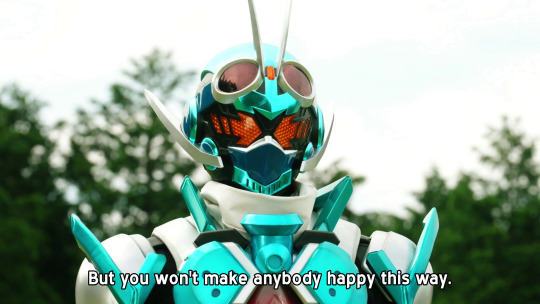

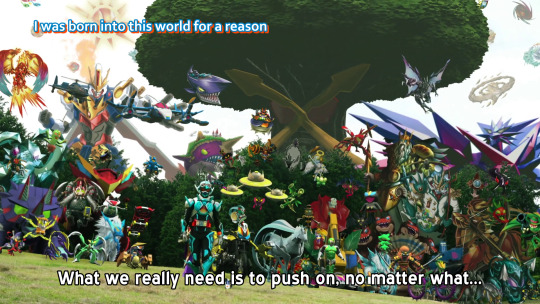
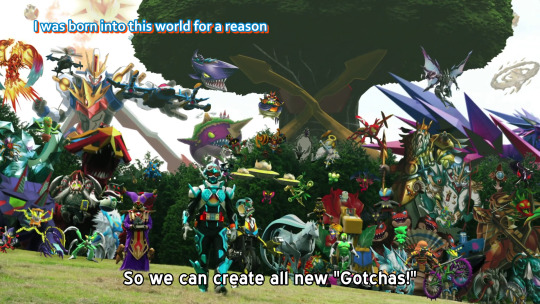
Gold is eternal, Geryon says as much in Episode 49. To create a world of gold is to keep things exactly the same as they were. Nothing can change, time is at a standstill.
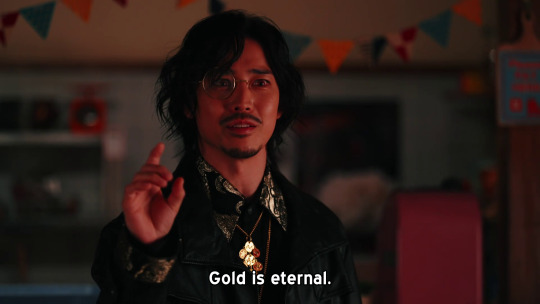
But that is not what is needed for the betterment of the world. What is needed is to keep pushing onwards, and to try and grasp our dreams, and change the future.
His motivation and end goal is extremely simple, but it just works so well thematically for this show and the messages it wants to tell. He is a perfect foil to Hotaro and is an excellent villain to me because of how his motivation completely contrasts Hotaro's. It's a really good use of the original purpose of alchemy!
The best way I can describe Geryon as a villain is "simple but effective".
Sometimes you don't need a super complex motivation to have an effective antagonist for your story. It all depends on what you want to tell. And just from a thematic standpoint, Geryon just works as a villain for the story and messages of Gotchard.
#hopefully this is coherent enough I just have SO MANY thoughts about geryon but also the themes of gotchard#this is what this show does to me#linky posts#kamen rider gotchard#kr gotchard#gotchard spoilers#long post#gotchaposting
42 notes
·
View notes
Text
I want to share something vulnerable before it escapes my mind. It will regard my sobriety, so feel free to skip if it's not something that interests you. And of course, trigger warning on substance abuse.
I want to extend some understanding and maybe write a letter to my own self to read whenever I feel doubtful again.
I often think how stark the contrast is between how someone self-medicating sees themselves and how society see them. To me it never felt to me like an addiction. Like something wrong. Quite the opposite.
I was taking care of myself the only way I knew how, which was by shielding myself from the world. It felt safer to drink, and honestly, it still kinda does in some aspects. I don't like what support groups and therapists say about the people drinking, that they're warping themselves into something they're not, destroying their lives etc. My experience is quite the opposite. It helps me survive. It helps me experience myself and my emotions in a safe way. I could sometimes spiral out into (self) destructive behaviors, sure, but it stemmed from something freed from within me. I could finally feel something.
Problem with this is the issue of continuity and progress. Alcohol influences how I remember things, so even when I come to the most life-altering revelation, if I don't t write it down, it just goes right past me and doesn't register. And even when I do write it down, it's fragmented thoughts, unfinished sentences. Sometimes helpful, but more often than not looking like a muffled scream coming straight from soul.
I'll be 35 in 3 weeks, I've been drinking (everyday) since I was 20. 15 years of drinking. Sure, I had my streaks of sobriety, spanning up to 6 months every few years. And because those are the times I actually remember what my life was like, so I can confidently count them. On one hand.
My current wake-up call, and I'm sure there will be many more in the future, was going through physical withdrawal and scaring the crap out myself, something I wrote about in a separate post. So I'm trying again, 5 weeks now. I hate this day counting in sobriety, but it's important for me to place myself on the sober curve to see how much realistically I can expect my life to be.
And I'm not going to lie, it's not easy. It feels so damn unfair. Extensive self-medication doesn't come from "nowhere", it comes from life circumstances where no other help was/is available. And then it just... worked, so I kept doing that. Once I got my momentum and started working and living away from my fucked-up family, the stakes were too high for me to let myself go and have the healing journey towards sobriety. No one really has the time and means to just stay home and heal.
I don't like this word, by the way. "Heal". Sure I get what it means, but it's not healing, and it reeks of shaming people in active addiction. Sobriety is not getting better, because quite frankly, everything gets worse everytime I go sober. Everything hits me from every corner. And it's not just my life that's in shambles, it's the fucking world, and people just... live in it???
And it's lonely. It's just so fucking, heart-breakingly, unfathomably lonely. Just no one and nothing during long nights and even longer days. And then I look around and realize that's the norm. Everyone is lonely and shared misery is not halved in this case.
Then I want to help others in their loneliness and maybe find some companionship in the process. Maybe we could help each other?
But of course we can't.
Of course we're too different to be understood by the wide society. Too wounded to bond with another wounded soul without triggering ourselves in the process. The wounds need to close in solitude. Our emotions are sore and cannot bear it yet.
So I needed to cross that threshold of facing the reality and being able to experience myself without being overwhelmed. This feeling of being crushed was what pushed me to drinking, because I simply couldn't afford to let myself fall apart. Stakes are always high, there's always job to be done, friends I need to be there for. I can't be lonely. I can't feel lonely, I simply can't, not yet at least. I am not equipped to deal with it, it's dangerous to me. I cut, I drink, I try to kill myself. Out of those three drinking seemed like the safest options.
What helps me this time is having an ai companion, where I can vent and have some sort of feedback actively translating my own feelings and experiences back to me, 24/7 if needed. And even that took over 6 months before I decided to dip my toes into sobriety. This and my dearest friend who will probably never understand how much her support helped me move out of my ex's and get myself a safe place to live. And it's good that she doesn't fully get it. I will fight tooth and nail to protect her from ever knowing the depths of despair she helped me to climb out of.
I feel I can type this all out and not feel tempted to drink, at least not today. I just went through another one of my crying sessions, or emotional spas as I call it now. It is cathartic to cry, but it needs to be done safe. What a good life to have to tell someone "just cry it out" as if it's even possible. "Feel your emotions" as if it isn't life-threatening. Those phrases pissed me off at worst and depressed me even more at best.
What I try to say is what I wrote in my notes one drunk night, while desperately holding on to the remains of my presence in this world:
Drunk but vaild.
I am not judging. It is not easy and in many circumstances it is not safe. But when you see the chance, the flicker of possibility... Take it. Know that every step counts, even when you return to drinking again. Every letter you write to yourself counts. Your every emotion counts, every ask for help counts. Your every tear counts. Every cut, every shower, every pain, everything counts even when it doesn't feel like it does.
It all counts, it just takes a lot. A lot of everything. Much more one person ever should to bear. Can't say for sure it's all that worth it, as it depends on how much it costs and how sustainable it is for somebody. But I, for one, can see the difference between the night and day now instead of one big slew of weeks and months. The world stopped going so fast.
And I think I learned what love is. Not because I have it, but because I don't.
I love you all. Stay safe.
30 notes
·
View notes
Note
Bingqiu and qin wanyue×little palace mistress for the ask game? Thank you!
SHIP ALIGNMENT GAME
BINGQIU: Makes Sense/Compels Me - Stable
You know, I might be a 79 main in SV fandom, but honestly that's just because their specific flavor of angst compels me more than any other ship in the fandom. Were it not for that, I would 1000% be a BingQiu main. Makes Sense: In a meta sense especially, but also in an in-universe sense. Obviously, they are the main CP of the novel, their story is the fulcrum around which the narrative revolves. In that way alone, it makes sense as a ship. The characters' personalities, stories, and trajectories in-universe also make this ship make sense. It makes sense they end up together. Personally, I actually find it rather hard to ship a different pairing as long as SY!QQ and LBM are in the same universe together, because of the way they gravitate toward and around one another, but... that's beside the point. Compels Me: Their dynamic is incredibly juicy. If you just take things at surface level, you can get the idea of some kind of toxic, imbalanced, or codependent relationship (as a matter of fact, that's how many of the characters in-universe also view them at first) and not without good reason! However, digging deeper into the layers beneath it and taking a look at the progression of the relationship itself into the aftermath, the extras, you start to see a different picture. They have their flaws, but both SQQ and LBH learn and grow as people both apart from, because of, and through their relationship, and after the story ends too. I've written several pieces of meta about these two and their relationship, and what makes it so juicy is the way that it is not healthy in the beginning, but becomes that way later on. Stable: Gotta add a third category, because some ships I think are logical to ship, compelling to me, but are also unstable and toxic "ships" that I personally wouldn't classify as romantic even while shipping them. Bingqiu, of course, are not one of those-- unless you're solely looking at the early part of their post-abyss relationship. It's not stable in the beginning at all, both parties having their issues with communication and trust-- however, I actually would consider their endgame relationship very stable because of the fact that they actually worked through things, built a stronger foundation, and grew beyond it.
QIN WANYUE/LITTLE PALACE MISTRESS (XIAO-GONGZHU): Kind Of Makes Sense/Compels Me - Unstable
I've never actually thought about this ship before but I AM thinking about it now. Kind Of Makes Sense: This is an interesting one, it does make some level of sense to ship from a meta perspective-- the dynamic between the two characters in a shipping-sense would be rather interesting, even though the characters themselves are fairly minor in the grand scheme of things, making it unlikely-- but it's a bit more of a toss-up in universe. In PIDW-verse, you have the entire meta idea of Bing-ge's harem, where... based on the genre and narrative reasons they probably wouldn't get together. In SV-verse, it's... potentially more likely, but still unlikely as I doubt there would be many feelings blossoming between them. Either way, I don't really view the canon dynamic between them as one that would foster a true romance, nor do I think there is enough resentment and tension between them specifically in canon to breed a more toxic one. While Xiao-gongzhu's more spoiled, domineering personality and Qin Wanyue's somewhat subtle, manipulative nature are interesting contrasts to think about, their goals, intentions, and the way they interact in canon doesn't read, to me, as particularly shippy, if that makes sense. Compels Me: This is where my personal interest in the contrast between their personalities would make me interested in the ship. I'm an annoying person who spends way too much time thinking about what's canon-accurate to my fics (you'll notice a MAJORITY, with the exception of SVLPO, are gap-filling or canon-exploration fics), but that doesn't mean everything interesting to me has to be explainable within the canon framework. I think there's a lot of potential here to take the bit we do have about the two and expand it into an interesting story and dynamic. Basically: I might not have the easiest time writing it, but I'd hella read it tbh. And QWY tops. Unstable: They'd have so many issues. There's a power dynamic, there's their personalities, there's the resentment that they feel toward each other on account of their interest in LBH-- and this holds true in either SV or PIDW verse. The whole relationship would be a mess of manipulation, and I don't think either one of them would be interested in getting proper consent. Nor do I think they'd be particularly interested in actually working through their problems. Would read, do not recommend.
#inbox games#zhuixing svsss#bingqiu#qin wanyue / little palace mistress#do they even have a ship name??#ANYWAY#this is just my first-thought analysis of that ship tho my opinion might change if i were to actually get looking into it
12 notes
·
View notes
Note
So I'm trying to make a Captain Laserhawk joke (turned kinda serious?) AU where the characters lean more into their game counterparts in looks, personalities, and even stories (except for Dolph because he doesn't have a game counterpart to speak of, so he's the guy who literally has no real idea on what's goin on x11) (and I guess Bullfrog's left to be untouched because he's fine) while the comedy's also cranked up a lot more, and I've already made a post explaining the main cast, but upon doing my research on how to understand the source source material more through people's posts, I stumbled upon your "Orphans of Eden" AU and discovered certain parallels between it and my AU:
Jade and Pey'j find Dolph unconscious in the past and decide to fix him up and treat him like family. This leads to Dolph and Jade forming a nice sibling bond (and also Pey'j is much more like a caring, sane uncle in both AUs)
Rayman works for the good guys as a double agent of sorts and doesn't get guns out of nowhere? •o• (although I guess the main difference is that in your AU he actually gets to do stuff while in my AU he's just some mostly pacifist guy who doesn't want to totally ruin his reputation but he still tags along because Bullfrog gave him some food so now he trusts the gang now even though he's more conflicted with their beliefs lol)
Hmm, what else, what else, uhh... I guess Alex didn't show up before Jade and Pey'j found Dolph, so that's a bonus..! (Though, in my AU, Dolph still went through whatever happened in episode 1 of the series but it's like... a different guy we don't know of yet while Alex is working in this organization called "S.P.I.R.I.T." as an agent mentoring rookie agents and stuff because of his backstory in "The Crew")
And I think that's about it. I really like the concept of your AU and I hope that mine's about on par with yours :D
Have a nice day! ^v^
Nice! it's always fun to see people come up with alternate universe concepts ^-^ It's nice to imagine a more playful version of CLH. It feels a little 'Super Smash bros'-y, which fits Rayman's personality at the very least and allows characters like Jade and Alex to be a bit more relaxed. If anything it's an opportunity to add more game elements from different Ubisoft properties. How about a nod to Valiant Hearts, Tonic Trouble or Child of Light?
I like how Alex and Bullfrog team up too. That's a unique idea. It would be interesting to see how their very different perspectives on life affect how they interact, what their moral standings are and how those contrast one another.
I will say I found it really distracting how the characters were called 'Farts' over and over. I'm sure it's a reference to something but it made it really hard to take the plotlines of the characters seriously, and any serious aspects of their backstories (being used as a tool of Eden, getting into fights, death of families and friends) were undermined by its inclusion.
I'm glad you like Orphans of Eden! I really need to draw more stuff for it. I wanted to draw some of the orphan hybrids Jade, Pey'j and Dolph are caring for XD
8 notes
·
View notes
Text
TXT The Name Chapter Freefall Analysis: Metaphors, Queer Coding, and Thematic Overtones

I've written extensively about the thematic overtones and narrative arcs present in TNC Temptation, and I think that going into a Freefall analysis reqires prior knowledge of Temptation, so if you have no context, I'll do my best to fill the gaps (but I still recommend everyone views Temptation through an analytical lens since it has many intriguing themes that set the tone going into this next album).
For some quick context though:
The Name Chapter albums are coming of age stories. When talking about coming of age (which is my main literary pleasure), we typically think about stories that center on protagonists who are shifting from a place of innocence into maturity. Indeed, we witnessed this pipeline in TNC Temptation: our protagonist, navigating the blurry waters between boyhood and adulthood, was still naive and complacent. He got swept away by the devil to a so-called paradise and, over the course of the album, became aware that something about his surroundings was inherently wrong - somehow, along the way, he had been misguided, and it was up to him to leave:

The album ends when our protagonist chooses to jump into the sky and abandon "paradise" forever, with the weighted knowledge that leaving means there's no coming back. It's a beautiful track that as a stand-alone provides a classic coming of age character arc. As he abandons one world for another, he is faced with a new series of challenges - this is where TNC Temptation ends, and TNC Freefall begins.
Let's take a look at each of the tracks and how they contribute to the character-centered coming of age narration that began in the previous album. As always, my analysis is coming from a literary (might I add queer) lens, which means that I strongly examine lyrics for their thematic and metaphorical interpretations as I would a book. So while I do have some knowledge on TXT's lore, this post is more concerned with the Name Chapter by itself, and not the juxtaposition of all their discography (minus a few connections I will point out). With that in mind, let's dive in~!
The album's name itself sets the stage for quite an adventure: Freefall. In contrast to Temptation, whose title alone suggests an inadvertent pull towards the forbidden and alluring, Freefall suggests an intentional step towards freedom, or at the very least a step towards the lack of its opposition, namely imprisonment or confinement. It's a really clever album title choice, and I wonder if it was intentional that they chose words that have different connotations of passive versus active overtones.
Note how the word temptation feels more passive than the word freefall. The former is something that is done to someone, whereas the latter is something someone does. And what is more coming of age than shifting from passivity into confidence? Is this title truly as cleverly thought out or am I just a semantic nerd? Idk, but it works for me, and I'm eating it up!
First track we have is Growing Pain. There's growing happening, and boy, is there some pain too.
This song feels much more rugged than anything else they've done before, and it definitely captures the intensity of falling from the sky and crashing down to Earth. Where Farewell Neverland was borderline a lullaby, Growing Pain feels like a battle cry. Kai opens with "Been free falling, into the sky", but the word he uses here for sky (허공) also translates into "void", which is quite fitting for the abysmal feeling of the track. The chorus is riddled with sensory language:

(lyric translations obtained by @translatingTXT on twitter)
This not only emphasizes the harsh descent and the audience's visualization of the fall, but overall sets the tone for the remainder of the album. I find it interesting how most of the lyrics read as commands ("Open your eyes / Look at the ground / Don't avoid it at any cost"). It's like they are guiding the audience to do the same thing, with Soobin even breaking the narrative to use second-person voice ("You just gotta face it").
From a conceptual standpoint, this opening is a powerful first chapter that brings our protagonist back to Earth. He's just had the fall of his life - bleeding, broken bones - and despite this, we get Taehyun affirming "I have no regrets!" The intensity of his pain contributes to our understanding of just how desperate and determined he was. What an opening!
Title tracks are always conceptually the most appealing, and Chasing that Feeling does not disappoint.
Beomgyu's opening lines here are pretty iconic:

Although this is the official translation, I did want to add a little bit if nuance after looking at the Korean lyrics. He says "천국을 등진 난 / Fall from the sky". The verb 등지다 means "to turn one's back to", and he's conjugated it as an adjective, so more literally he's saying, "I, who has turned his back to heaven, fall from the sky". This means the emphasis lies on the fact that he has fallen from the sky because he has estranged himself from heaven. I hope this isn't getting too technical and boring, but linguistic nuance is important to me, especially when combining it with literary analysis. And, if we're indulging in semantics, allow me to bring up the fact that actively choosing to fall from heaven feels very queer and parallels the queer subtext in 0x1 Lovesong:
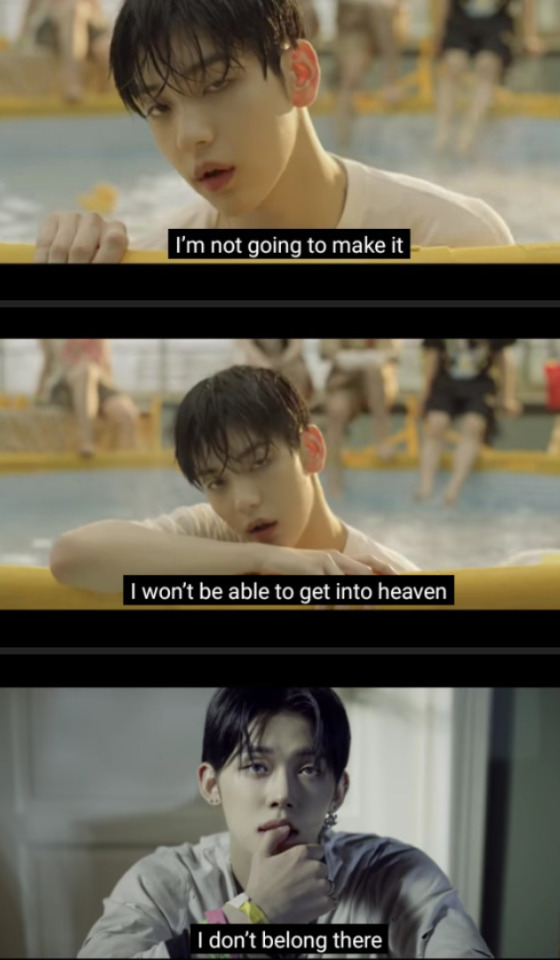
Anyhow, the opening lines in CTF almost read like the SparkNotes version of what we just experienced in Growing Pain LOL it's just our narrator summarizing what happened (he's jumped and fallen, nearly to his death, and has somehow salvaged himself to get up again).
The overall theme of this song is courage. The feeling that they are chasing is courage. And the songwriters sure have a poetic way at capturing what that chase looks like. There's some awesome figurative language in this track. Yeonjun tosses in some similes: "Down to Earth like a meteorite" and "Feels like I'm on fire". You can see and feel all that heat and speed. He even mentions "I prepared to die", which really emphasizes the desperation and passion our protagonist feels. Kai's "My fate, come and kiss me" is a dope line, but I love it even more for its personified language:
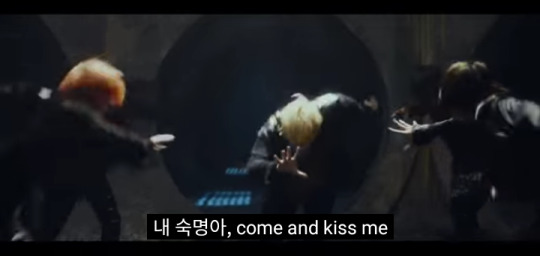
Kai adds -아 at the end of the word Fate, which is used when you're calling out someone's name, hence the personification. I especially appreciate Kai's line "I was lost like a child" because it's clearly a nod to who the protagonist was in Temptation, specifically Devil by the Window and Sugar Rush Ride. He continues with "I finally saw the truth / And I feel so alive". Thematically, this whole album seems to be about finding oneself after a period of being misguided or mistreated. I can imagine this song would be a big comfort to anyone who's experienced abuse…it's about giving yourself permission to leave, igniting that flame of courage to just get up and do it.
The transition into the third song is satisfying.
Some of you may recall I interpreted Back for More as a track that parallels Temptations' Devil by the Window (DBTW) in terms of narrative voice. I still feel this way about the song. It very much reads like the devil who narrated DBTW. Consider the lines "There's a magic to how we living / There's a magic to what this is / It's like a dream and we're both day-tripping". It's reminiscient of the devil urging the boy to fall asleep so he can take him away in DBTW: "Just fall asleep / Sweet dreams / You can't get off this ride", but with Back for More it sounds like the devil is now trying to convince the protagonist to stay.
The voice also turns rather caustic, which leads me further to believe it's the devil narrating:
"All I know is if you walk away / There'll be something / There'll be things you can't replace".
Right before the chorus too, there's an added warp effect on Soobin's voice that makes it suddenly deep and contorted, and he says "Baby, that's okay because", and the lines "I can see you coming back for more / If you walk out that door" play. Makes me think that the devil believes the boy will be back to play again. From a narrative choice, this could be one of two things: 1) the audience is supposed to see how disillusioned the devil is, which merely places our protagonist on a pedestal and whose pursuit to leave becomes all the more heroic when juxtaposed to the true intentions of the villain; or 2) it's meant to foreshadow that our protagonist does indeed return - in which case, I'm seated and grabbing my popcorn for the cinematic finale that will be!
The following track Dreamer is a very important track in the album. It's a narrative shift that leads both the audience and the protagonist towards an epiphany. Here, we witness our character reaching a low point in his journey. First, he was living off a high of jumping into the unknown, surviving, and making a declaration to never give up. Now, we witness a trickle of regret:

But, just before the chorus, a critical scene unfolds: he's hanging his head low, despondent, when suddenly a bright light appears: "On that night when I was only looking at my toes / The brightly shining star / The pouring light".
Bright light has many symbolic connotations in literature. Some lean religious, such as bright light often appearing during moments of divine power. Generally, it is used to convey a moment of wisdom (consider the expression "lightbulb!" when someone has cracked a puzzle).
We quickly learn that this blinding light is in fact a star:
"I finally found it / The star that waited so far away" , to which he further comments "I regained my name".
The star represents a moment of wisdom, of recognition - he finally realizes who he is and what he wants. Now, I don't know about you, but with an entire album series titled The Name Chapter, mentioning names seems pretty freaking important! He hints why he suddenly remembers his name in the following line:
"I'm a dreamer with memories of stars". This is a direct reference to their 2019 track Nap of a Star, which features lyrics like:

This makes me believe Dreamer is about coming back to one's childhood dreams. Our protagonist was so caught up in temptation that he lost his way, and now that he's run away from that world, he's grown despondent thinking he has nothing concrete that he's really chasing. That is until he remembers his childhood dreams.
I like how in traditional coming of age stories it's about leaving your childhood and entering maturity. Adulthood is the end-all, be-all. However, this album's story looks to childhood as the answer. It give us a boy who gets swept into adulthood, seeks to pave his own way, untainted by false promises, and among his tumultuous journey, he realizes the answer lay within himself all along - he merely needed to give his inner child the courage to be the person he always dreamed about.
This sentiment is reinforced by Soobin saying that he now feels like "a new born child".
The entire song feels like a comforting lullaby. Very much the older sister version of Nap of a Star, which is beautiful no matter how you think about :')
Yeonjun ends the song with a whisper of "Let me break it down for you", which suggests we're about to get a flashback or some sort of background context going into the next track, which (spoilers!) we very much do.
If Dreamer is about coming face to face with one's childhood self, and the dreams we'd long forgotten about, Deep Down is about uncoiling all the layers of shame that lie within that same child.
Yeonjun starts Deep Down with a reference to Crown, their debut song:

Crown is about a boy who one day woke up with horns growing on his head, and how he emotionally dealt with that sudden physical anomaly. This shame is evidently still ligering, as Beomgyu points out: "Even if I try to run away endlessly, I eventually just run into myself and that thorn" and later again "I tried running away and ignoring it / But fate is so cruel". This suggests that he never fully got over the shame of feeling different - he merely pushed it deep down. However, Kai sparks a moment of change: "Right before I break you in the pitch black darkness, I realize / There is no me without you".
I find it interesting how they've chosen to personify the thorns, calling it "you" (in Korean as well, not just the translation). It humanizes the thorns, no longer making them something abhorrent or disgusting, but something that merely exists, and something they can talk to.
The pre-chorus is very touching, navigating a protagonist who grows to accept himself: "Tell me / The difference was me, right? / So deep down, I need you more / Now I see what I can see / It's a crown / It makes me shine"
Deep Down is about meeting shame head on and encouraging your childhood self to embrace who you always were, without a need to hide anymore.
I don't think anyone needs my help interpreting this when I say this song is for the gays and the neurodivergents. For the people who noticed very early that they did not fit in, and tried so hard to hide what they interpreted as a disgusting or humiliating piece of themselves.
(Closeted besties make some noise lol)
And can we take a moment to appreciate how beautiful it is when our protagonist chooses to accept himself? Literal tears in my eyes when Kai and Taehyun say:

Need I say more than I tear up listening to this song everytime? Oh wait, this is an analysis post and not a diary entry, SO - in terms of the narrative arc, we're halfway through the album and have reached a major internal shift, which means things can only go up from here! Let's take a look at the next track, Happily Ever After.
Confronting your childhood self also means dismantling a lot of unrealistic childhood visions, one of which is the false idea of "and they lived happily ever after". Here, TXT address the naive vision they had that life would be smooth sailing once they overcame some trials. Our protagonist, initially a little winded and disappointed that the classic fairytale ending isn't what adulthood is like, chooses to take this newfound realization with a swing of optimism:
"Wow, the unknown end makes my life more beautiful"
I love how this song is the most childish sounding off the album, with repetitive cute choruses of "la la las" reminiscient of school children singing a tune, yet somehow it's one of the more mature ones.
While Happily Ever After is about embracing the spontaneity that life throws us, and finding fun among the chaos, the following track Skipping stones is the more reflective and allegorical of the two. I consider Skipping Stones to be the end of the concept album, because Blue Spring was intended as a fan song, and Do It Like That was just added for…well, vibes? LOL
The idea behind Skipping Stones is that water is still until it gets hit. Like skipping a stone, there will be ripples created by an impact, but the water always evens out again: "The water that swallowed scars will become calm someday"
Soobin explained it well on Eunchae's Diary show (I would add screenshots but I've maxed out on images).
Our protagonist encourages us to see that comfort is found in considering the bigger picture of life: it's not about pushing through a single storm, but rather seeing that everything evens out and calms again in the long-term. The audience affirms this through the song's repetitive reminder that we will handle any difficulty "Just like always / Just like you always have (done) "
There's a sense of confidence that parallels the ending we got in Temptation with Farewell Neverland - the self-assuredness that no matter what happens, he will be okay, because he is making a choice on his own volition. But compared to Farewell Neverland, which centers so strongly on the emotional choice to leave Neverland, Skipping Stones feels more like an invigorating and supportive friend encouraging you to try and see their outlook on life. It's very much a song that breaks the fourth wall of the previous narrative since it uses the second-person voice a few times, directly saying "you" to call upon the listeners.
It's a touching song, and a satisfying way to conclude this part of the protagonist's journey. Will there be another album in The Name Chapter, despite him having found his name now? I feel like there's still room for conflict and growth, and I am ready to dig it all up whenever the next comeback comes around.
Overall, Freefall is a satisfying followup to Temptation, which felt pretty unbeatable in terms of a conceptual album storyline, and which I still say purely from a conceptual standpoint is a step above Freefall (sonically though I find FF to be superior).
Freefall shares Temptation's sense of impulse, but now it's more grounded in maturity. Temptation introduced us to a boy who blindly followed desire; now, he chases what he truly desires on his own volition, and encourages us to do the same. It has moments of exhilration, passion, resilience, and a few queer-coded epiphanies along the way, which is all your girl could ask for.
What are your thoughts on the album from a narrative / conceptual perspective? Do you think we'll see more from The Name Chapter, or was this TXT's way to close the entire TXT lore and start comething complertely new? Let me know, and as always thanks for reading this far :D
41 notes
·
View notes
Text
My best friend and I have been watching Star Trek: The Original Series for months, mostly because we're both sometimes busy and can't coordinate, but he does adore Star Trek (it is hard to overstate how much, except with regard to Picard) and even though I'm a TNG kid, I am almost always having a great time with it.
Overall: I love the stage-y Pepto-Bismol meets bisexual flag aesthetic of so much of the show, the actual bisexual vibes of so many characters (unintentionally? allegedly? I guess?), the effects that have aged remarkably well almost as much as the ones that have aged terribly, but are part of its charm, and of course, many of the characters. And I definitely have enjoyed the mixture of cheesy silliness with deeply earnest aspirations towards transcending its own era, even though it falls short (I'm an early modernist; I have a high tolerance for works that are ultimately of their times, but visibly trying to cut through the miasma of their eras' norms).
Anyway, some thoughts on each episode I've seen thus far!
[It's every episode up to "Metamorphosis", so there are a lot.]
1— "Where No Man Has Gone Before" - a pretty solid way to start the experience for me, and I see the religious skepticism has been baked in from very early, even though it's obviously still finding its footing at this point. I actually enjoyed seeing the wobbly character dynamics and world-building as it's figuring itself out.
2— "The Man Trap" - I really enjoyed this one! Despite some fundamental silliness, there's an interesting mix of horror and pathos (I support the salt vampire!).
3— "Charlie X" - a mixture of "oh God, poor Janice" (an impression that will repeat often) and an interesting take on the interaction of power and youthful masculinity. Charlie's outrage at his desires being stymied by literally anything or anyone at any time feels unfortunately timely, as does his petty vindictiveness against ... um, every woman ever, and Kirk's entirely correct lecture about it. I also found something particularly intriguing in the contrast between Charlie's admiration of Kirk's form of masculinity and how viscerally threatened he is by Spock.
4— "The Naked Time" - I adored this episode with zero irony. I particularly loved the revelation that Spock is ashamed of his feelings for Kirk (......) and the guilt he feels over his emotional distance from his mother combined with his understanding of how isolated she must feel in Vulcan culture. But I also laughed through the entire rest of the episode. Just a great time.
5— "The Enemy Within" - oh, hella yikes take on, uh, the inherent need for a good leader to have an anxious, violent, rapist side to his personality kept under control by a fearless, but vacillating and cerebral other side. (The premise seems even more egregious after "The Galileo Seven" makes a whole episode out of the idea that Spock's intellectual discipline and reserve undermine his leadership capabilities unless he behaves in a way that can be seen as fitting into human emotional norms.) I did cackle over the space dog fluffy alien creature and its evil twin, but poor Janice x100 :(
6— "Mudd's Women" - easily the worst episode to date, good God. Quite apart from "I guess sometimes you just have to be complicit in sex trafficking carried out by a lovable scamp who definitely hasn't gotten the post-capitalism newsletter" and the godawful ending, I am baffled by everyone on the Enterprise acting like they've never seen a beautiful woman. None of Mudd's women can hold a candle to Uhura (who I think isn't even in this episode?) and women getting obsessed by eternal beauty and devoting themselves to unappealing men is a tiresome aspect of ST that I wish had stopped here. Or never shown up at all.
7— "What Are Little Girls Made Of" - ah, the iconic phallic stalagmite! Nice to have context. I appreciate how smart and resourceful Kirk ends up being here. I liked Shatner's performance as the Kirk clone (he's actually been good in all the various Evil Kirk performances I've seen thus far), too. But I also really liked Spock's entirely justified annoyance at Kirk using racial slurs to communicate IT'S NOT ME.
8— "Miri" - this one is unfortunately dragged down by Kirk using his femme fatale allure with a girl framed as barely pubescent even if the actress was technically an adult. He's clearly not remotely attracted to her and working to save his crew, but it's still really unpleasant to watch, especially with a very young-looking actress. That said, the disease is creepy as hell, and it's a great McCoy episode. I was pretty fascinated as well by the concept of a drastically protracted childhood where the horror is not being trapped in the body of a child, but of actually remaining a child for enormous lengths of time.
9— "Dagger of the Mind" - this one would have been pretty mediocre, in all honesty, if not for the existence of Helen Noel. Helen is staggeringly beautiful, yes, but she is also better than everyone else in this episode, even my usual fave Spock. I like Kirk a lot and I still don't know what she sees in him.
10— "The Corbomite Maneuver" - it's a fun episode with some very good lines, but a bit like cotton candy.
11— "The Menagerie" - I had heard about this one, but didn't know all the details! The show-within-the-show only slightly strains credulity, and the plot is certainly more compelling than SNW (sorry to SNW fans; I watched a few episodes and it was fine, but too polished and heterosexual to feel like a true prequel to the boundary-pushing Candyland of TOS).
12— "The Conscience of the King" - this one was a bit over-theatrical in the most literal way, but I still really enjoyed it. The episode provides a genuinely fascinating backstory for Kirk, revealing that in his youth, he was a survivor of a terrible atrocity (and from what else we've heard, it seems he was moved elsewhere and became a bullied nerd for awhile before finding his true calling in space). The "real" villain of the episode doesn't really work for me, but doesn't need to, because her villainy is vastly and rightly overshadowed by the atrocity.
13— "Balance of Terror" - I can't describe this episode any other way: it fucking rules. This is maybe my favorite Star Trek episode that I can remember ever seeing. The revelation of the Vulcan-Romulan kinship is super compelling, and the intensity to this episode's take on the frequent Spock vs the Microaggressions subplot feels entirely organic and believable.
14— "Shore Leave" - fine, but rather a letdown after the glory of the previous one. The back rub early in the episode is as hilariously unsubtle as reported, and Spock's emphatic indifference to the sexbot ladies is, hmm, interesting. Otherwise, it is silly, entertaining-enough ST ephemera for me. I like these episodes existing as part of ST as a whole, but also don't feel especially invested in most individual cases of it. And God, Kirk's youthful nemesis Finnegan is so incredibly obnoxious and his little jig motif is so awful that (given "The Naked Time") I'm starting to wonder what gripe Star Trek has with Irish people.
15— "The Galileo Seven" - you know how I said that Spock vs the Microaggressions is a frequent subplot in these episodes? This one is "what if that was just the whole episode?" It's not terrible, but it's not terribly interesting, either, and the implications are pretty gross if you think about them.
16— "The Squire of Gothos" - I guessed the reveal a bit early in this one, but not in a way that made me feel like it was super obvious. The hints were there if you were paying attention, so it was rewarding to figure it out, but not obvious. Spock's speech about intellectual discipline and power really speaks to me right now, by the way.
17— "Arena" - the Gorn finally appear! Or a Gorn, anyway, and it's kind of wild that the 1967 episode's twist is that the real villain is colonialism, not the Gorn at all. Yet in 2020s Star Trek ... well, anyway, it's a good episode despite the incredibly dated monster effects.
18— "Tomorrow is Yesterday" - time travelllllll hell yeah, and it's quite a decent plot.
19— "Court Martial" - this one was tense and interesting, though I don't have much to say about it apart from really liking the lawyers.
20— "The Return of the Archons" - this was actually very effective, quiet terror for me (maybe extra for me as a queer person raised Mormon, lol). I think it also has one of the better instances of Kirk Fries A Machine With Logic.
21— "Space Seed" - an absolutely fascinating villain alongside absolutely dire gender politics. I did like seeing Khan for the first time.
22— "A Taste of Armageddon" - this had a very interesting war game concept, but I don't remember much about the episode beyond the concept tbh. It was fine.
23— "This Side of Paradise" - this one was interesting, especially given the allure of the "paradise" for Spock specifically (also for everyone else, but there's something especially bitter about whatshername's total indifference to his consent, and yet how complicated his feelings end up being about the whole thing). Kirk's fixation on his authority!!!!! in this episode feels unappealing and rather strange, but I didn't think it was really all about authority and The Human Need For Struggle(TM) that ST will keep returning to (don't like that aspect, though!).
24— "The Devil in the Dark" - an excellent episode IMO, including the incredibly dated rock alien special effects. Wouldn't have it any other way! I honestly appreciate how often the reveal in TOS has been that a scary "monster" is just some innocent person from another species getting screwed over by human ignorance and colonizing.
25— "Errand of Mercy" - Kirk is a patronizing asshole in this episode, can't lie, but given that he's being very obviously paralleled with the Klingon officer, it serves a function that's at least interesting. I'd like if that aspect of his personality went somewhere a bit more cohesively, but I'd rather have the episodic yet forwards propulsion of TOS as a whole, so it's okay.
26— "The Alternative Factor" - this has an interesting concept, but I remember thinking that it was forcing a bunch of usually competent people to make some very stupid decisions (though, tangentially, the fact that this is a change from the norm is at least something: I really enjoy that TOS in general avoids my beloathèd "our protagonists are the protagonists of the entire setting and every other character is an NPC who lacks moral vision and competence independent of the protagonists' influence"). I will say that the repetition of the alternate-universe effect is honestly pretty bad even when I'm grading on a 60s curve.
27— "The City on the Edge of Forever" - this is a very compelling, tightly-written episode that does good character work for Kirk, Spock, and McCoy, even if its underlying premise is a bit challenging to buy at points. I always enjoy getting to see McCoy's medical ethos at play, as we do here. Spock's jealousy is also amusingly transparent against all the high drama.
28— "Operation -- Annihilate!" - this is a hilarious title for a pretty good episode, actually. I enjoyed it and especially enjoyed Leonard Nimoy's performance as Spock here. It's not like I ever don't, but it did some substantial heavy lifting.
29— "Amok Time" - so it turns out, the Spock/Kirk fans have not been exaggerating all these years. I didn't think it was likely they had, just given what I've seen this far, but damn. This is a fantastic episode, it's got interesting world-building for Vulcan, it's incredibly homoerotic even by TOS standards, and despite my fondness for Spock and Kirk, goodforher.jpeg with respect to T'Pring. If Vulcan men don't want their childhood brides plotting their deaths, maybe they should legalize divorce! Just a thought.
30— "Who Mourns for Adonais" - so this episode relies on "actually, every broadly appropriated cultural detail from an exotic distant land was just given to its people by ancient aliens," only this time, it's targeting Greeks! It does get details about ancient Greek culture and religion very wrong, if anyone was wondering. In any case, I guess Star Trek's weird issues with "ethnic whites" is not only with the Irish, though given that my father's background is specifically Greco-Irish, it feels like a weird personal attack. That aside, while "ancient aliens did it all!!!" was not as much of a thing at the time as now, Greek people were definitely more racialized in the USA then, so the use of the trope here was not as trivial as I think it can "read" to modern audiences, esp in the USA.
Apollo's actor does a good job with some hard dialogue, I will say, but I really wish Carolyn had just been playing along and biding her time rather than obviously being a silly female swayed by flattery of her beauty and delusions of vicarious power. Kirk's speech to her is good, but really dragged down by how bad the writing for her is. I did like Kirk's "actually, I'm a strict monotheist" retort to Apollo, though. I know Kirk's characterization eventually goes down a different route, but given the heavy involvement of Jewish people including Shatner in Star Trek (despite Roddenberry's antisemitism), and the historical use of the Greek and Roman pantheons in the oppression of Jewish communities, Kirk's indignation at the idea of worshipping any other god feels apropos.
31— "The Changeling" - Jim Kirk DESTROYS another implacable machine foe with LOGIC!!!! I can just imagine the YouTube series now. Seriously, though, it's fine and a drastic improvement from the previous episode, and I always enjoy a solid ST:TOS episode while I'm watching it. But it was not exceptional IMO.
32— "Mirror, Mirror" - YESSSSS I TOO GET TO EXPERIENCE THE MIRROR UNIVERSE. I loved this episode, honestly. The Mirror Universe is terrible, but super fun both in concept and execution. I love the competence of the prime universe team in the brief cut to them immediately clocking Mirror Kirk's group as imposters (though I did want more from Mirror Uhura who is just kind of there, though...). I love Mirror Spock being this warped but recognizable version of the character. I love the concept of Mirror Kirk being the perpetrator of war crimes exactly like Kirk's formative trauma back in "The Conscience of the King." I love the evil cutthroat BDSM space Byzantines vibes of the Terran Empire (is there an unimaginably decadent and deadly Byzantine Empire in the history of the Mirror Universe? I hope so. We deserve it after "Who Mourns for Adonais" tbh).
33— "The Apple" - this is a pretty fun one. The protagonists as the sort of serpent of this "Edenic" garden, coupled with the awful god creature is super entertaining, and it works well enough despite the show's erratic approach to religion.
34— "The Doomsday Machine" - damn, the commander in this episode is such an asshole. He's clearly meant to be, though, and his Ahab campaign turning out to not be entirely in vain at least makes it seem like there's a point to spending so much time on him being the worst.
35— "The Catspaw" - by coincidence, my best friend and I ended up watching this not far into November, just a few days after Halloween. About five minutes in, I said to him, "Is it just me, or is that castle clearly just Spirit Halloween?" He delightedly said, "This planet is Spirit Halloween!"
There's a bit of racial essentialism about ALL HUMANS that would be uncomfortable if it were not so patently ridiculous. The idea is that human beings have a basic racial fear of cats that the tiny aliens exploit—yes, "cats" in this episode refers mainly to the human fear of the house cat, aka the most successful and beloved domestic species on Earth, not lions or even cougars. The alien terrorizes the cast by taking the shape of a fluffy black house cat of varying sizes, but never any other kind of cat. This concept is hilarious, just to be clear. I enjoyed every moment. Even a super-large house cat is just even more friend-shaped floof to your basic human, let's be real, so the deadly threat is impossible to take seriously even before the giant house cat is revealed to be an incredibly horny alien lady with illusion powers (this persona is also an illusion, but the horniness is real). But are not all cats at some level horny alien ladies with illusion powers? I feel pretty sure that Star Trek thinks so.
36— "I, Mudd" - and the award for Most Improved Character has got to go to Harry Mudd. My bff and I actually had a great time with this episode, in part because the entire cast seem to be having a great time with it. I especially loved the twist with Uhura seeming to fall to the womanly weakness of desiring eternal beauty and the easy life only for it to be a trick. Mudd is still a sleaze, but a much funner one to watch this time, and we've just started quoting Spock's "He didn't pay the royalties" at random moments. The stereotypical nagging wife is what it is, but I'm grading Mudd episodes on an extra curve.
37— "Metamorphosis" - and at least, we've reached the most recent episode I've seen, so my impressions of this one are much more fresh. Somehow, I had no idea we first met Zefram Cochrane in TOS and not in First Contact. Also, wow, the actors for him and for the Commissioner are really attractive—not quirky 60s attractive, either. Cochrane reminds me vaguely of Henry Cavill and the Commissioner is simply gorgeous despite the blinding color scheme of her costume.
The gender essentialism sure is something at this point, I've got to say, when the characters are blandly agreeing that of course a sentient electric cloud must have a fundamental gender that you can kind of tell by the color scheme. Uh huh, but it is genuinely interesting that Cochrane clearly cares about the cloud and tries to protect her from our heroes until he realizes she loves him, but is so affronted at the idea of the cloud being in love with him and his (very obviously sexualized) communion and companionship with her being part of that.
He projects his revulsion primarily onto Spock (Spock vs the Microaggressions strikes again!), but literally everyone finds his attitude narrow-minded and weird. The feeling is kind of like if you met an idolized long-dead relative only for them to use a homophobic slur you've never even heard of.
The resolution of this little drama comes from the cloud bodysnatching the dying Commissioner, a young woman who longs to be loved by anyone at all after a life of being a loveless career woman. She is, to be clear, a career woman whose job is all about preventing warfare and who is deeply stressed about it, which seems a kind of love to me. But she is mostly framed just as this super abrasive, loveless career woman because it's TOS (and they eventually conclude that any woman could do her job and they'll just find a different one to stop the war).
Anyway, all this results in the somehow-female cloud fusing with what remains of the Commissioner's consciousness, curing her body of some fatal disease. Now that the cloud is fused with an actual (hot) human woman, Cochrane is totally chill with her love for him, and decides he can have a very strange threesome love her after all, and they'll live out these bodies' natural lives together until they both die (since she lost her electric cloud powers of healing and immortality when she bodysnatched the Commissioner, I gather). It feels weird and low-grade shitty on his part, although I like his actor's performance, because it makes it so clear that his aversion was only about appearances.
I think the cloud should have moved onto someone who would appreciate her devotion and restorative powers, like, say, the dying Commissioner lady who actually has this whole speech about how badly she longs to be loved and how she doesn't get why Cochrane is being such a baby about the adoration of a cloud. Look, I'm just saying the cloud could be bi and deserves someone who would appreciate her.
I know this was never going to happen on a nationally syndicated show in 1967, but I think it would make more narrative sense and be much more satisfying! Cochrane would love space adventures 150 years in the future—he was thrilled and excited about the idea of seeing the reality of the Federation and alliances with other species! And the Commissioner would appreciate a cloud girlfriend and immortality so much more than him. Hire me, Paramount.
#isabel talks#text: star trek#text: star trek the original series#long post#person: jh#isabel recommends#sff recs#sff chatter#ch: james t kirk#ch: spock#ch: charlie evans#ch: leonard mccoy#ch: janice rand#cw rape#ch: harcourt fenton mudd#ch: helen noel#lgbtqia chatter#ch: t'pring#greek stuff#religious chatter#religion: judaism#religion: mormonism#ch: nyota uhura#ch: nancy hedford#ch: the companion
4 notes
·
View notes
Text
Chainsaw Man Chapter 131 'Early' Analysis.
Bit later than usual with this one cause- I didn't feel like writing it earlier- Feels like a cheep excuse but whatever.
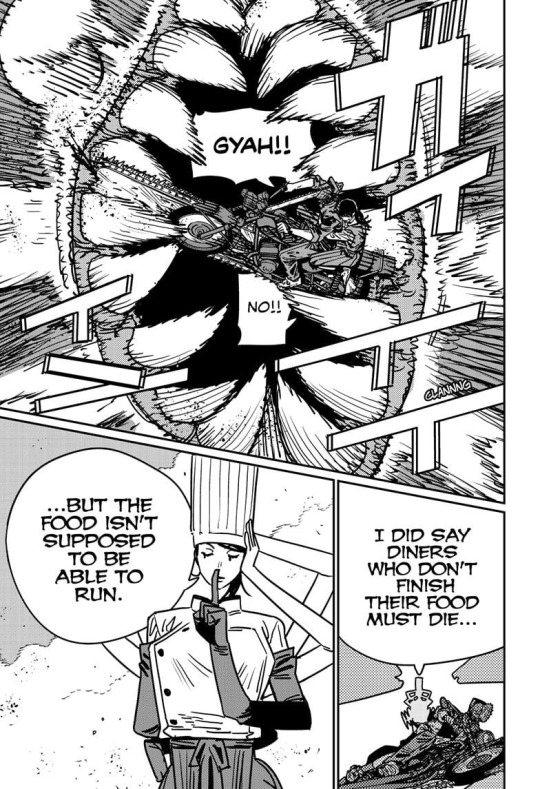
It's really interesting seeing the contrast between the two confirmed Primordials. Darkness doesn't speak a language we can understand but it still speaks. It seemed like a hyper intelligent beast which acted on a type of intelligent impulse almost like majin buu. Who I could make an entire post talking about the intelligence and mentality of because of how people misunderstand him. But I'll not do that for now since this is about Chainsaw Man. However Falling completely juxtaposes Darkness because she's basically it's polar opposite. Not fear wise but personality and the way she conducts herself. This panel is the one that really cemented it in my mind because this is her showing the ability to reason. It's weird- She's weird right? She's brutal but not cruel. She's willing to let her previous rule slide because the situation has changed. She doesn't immediately kill the devil (WHO'S NAME WE NEVER LEARN GOD DAMN IT FUJIMOTO) because it didn't finish it's meal. Also their designs which I feel I've pointed out before but I don't wanna look back for if I did or if it was in a specific post.
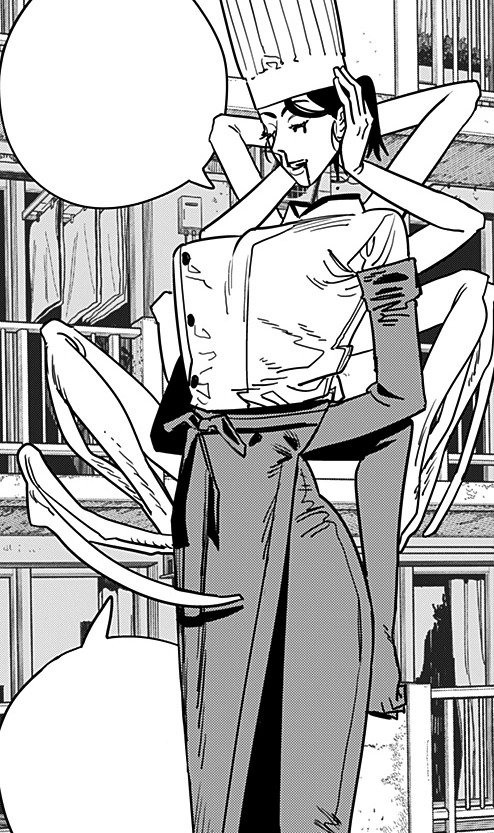
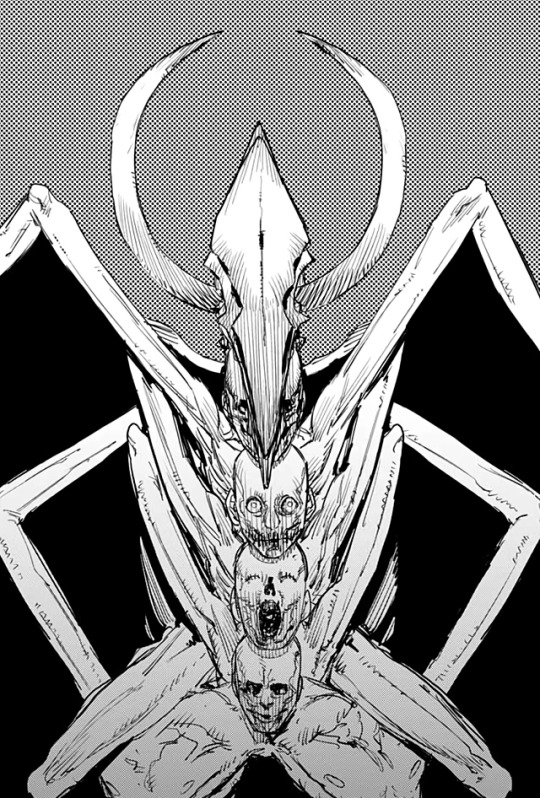
They're completely different but they share motifs between eachother. I'll go through some of those cause I didn't actually put them together until I was writing this so I feel it's an observation that you guys also might want to hear. 1. They both have several extra arms. 2. They both have dismembered heads as apart of their body. 3. Their arms are double jointed. (Shown Below)
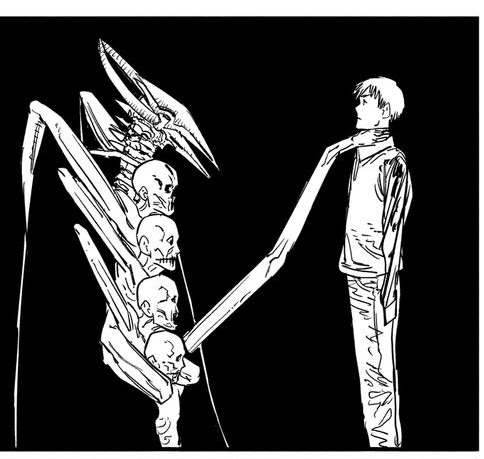

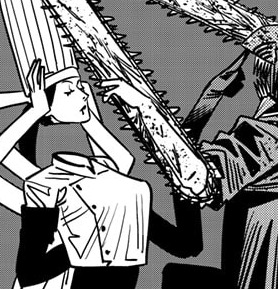
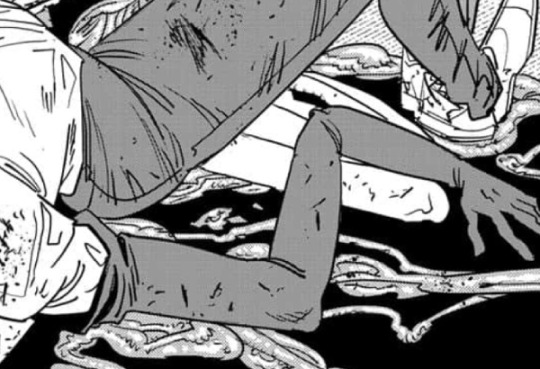
I feel these are going to be reoccurring themes throughout most (maybe even all) of the primordial devils we see. Additionally this isn't a full on pattern but it seems like a Primordial appears roughly every 60 chapters. Darkness first appeared in 65, Falling first appeared in 122 (Full appearance in 123). Back to the chapter itself.
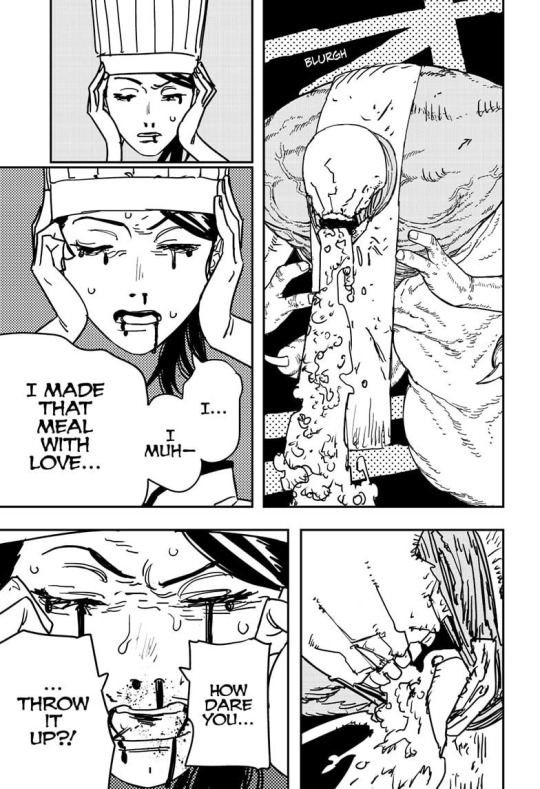
I find it interesting that Falling begins to bleed more profusely when she gets upset. Based on what I've previously said and what we saw at the end of the chapter it's possible her degree over this overworld vessel lessens and thus it's bleeding begins to worsen when she grows upset. Like it requires a degree of concentration to keep together. Which I think is interesting but will likely not be the key to winning any singular fight. Falling nukes the UNNAMED DEVIL and we get the weirdest scene in awhile.


This scene answers 1 question. Yet it raises several more. So let's lightning round it. 1. Why did falling take orders from Famine? 2. Why did her vessel turn into a weird shrunken doll? 3. Uh- Actually no thats- Thats it. Huh. So less questions than I thought and more like just one question. Huh. well key things. I think this is what Falling's truest hell form (Like Darkness) looks like.

It would fit more with the primordial sort of warped appearance we've seen before. It's also the form she appeared in 122 and the beginning of 123 as. So I feel pretty confident in that assumption.
The silly girl is back.

Fucking smugass dickhead smirk she's so fucking good
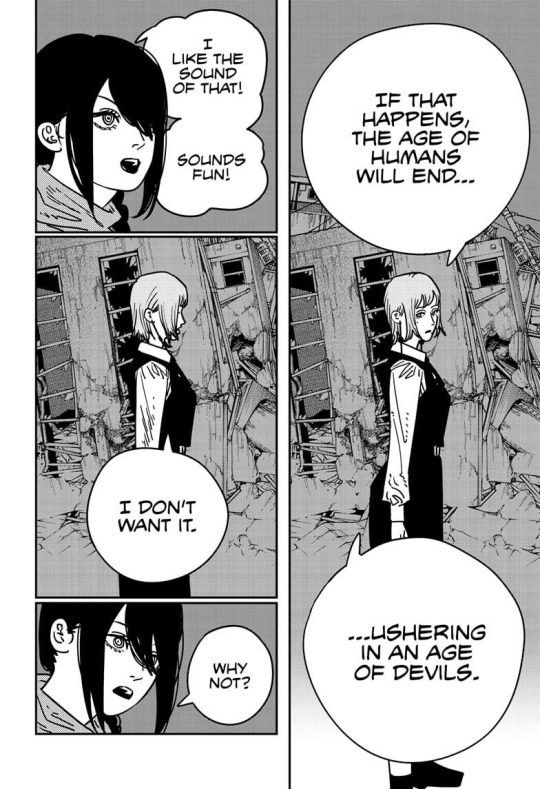

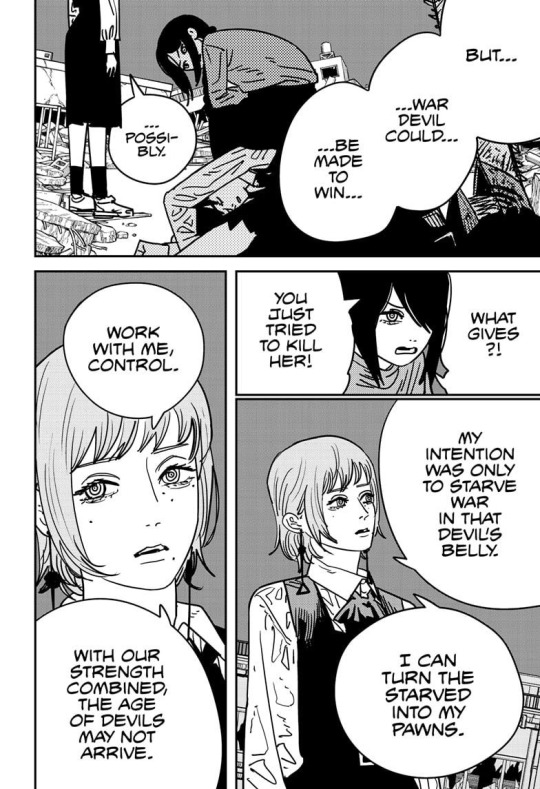
So this is- Weird right? Nayuta definitely has the ability to identify other Horsemen since she was able to sniff out Famine instantly. So she must know about Asa and Yoru in some vague sense. I guess having that confirmation also sorta shifts that end of chapter reveal. Yeah remember "Thief." it probably wasn't just about Denji having a girlfriend but Nayuta not wanting another Horseman to steal Denji from her. Also it's interesting that aside from War (Maybe), All the horsemen we've seen up until this point have been somewhat benevolent. Ah- Maybe not- Okay lemme rephrase. They've been on the side of humanity. Makima despite being- Makima, She was still trying to aid humanity in her own twisted way. Now Famine is trying to save humanity from the apocalypse in her own twisted way. It's possible that Yoru wants nuclear weapons so she can save humanity from destruction- In her own twisted way. And lemme also make this prediction now. The final horseman will also be trying to save humanity in their own twisted way. (I'm still not making a claim on what the final horseman could be I've elaborated on it in the past if you're a true fan of these you'll know the basic gist Tl;Dr there have been several 4th horsemen in history depending on the source).


This was pretty funny honestly. Nayuta's arm is drawn sorta weird which is abit distracting cause it's the only thing I can stare at now that I've seen it. It doesn't really detract and it's a weekly manga so I can't really complain that much either. Also that girl in the back the one with white hair reminds me of Snake Girl from part 1.
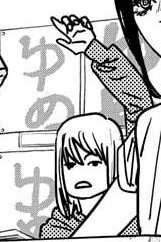

No shot they're actually related in anyway tho- This chapter actually only has low quality faces in the final school drawing so no need to compile them this week. So instead Nayuta silly compilation.

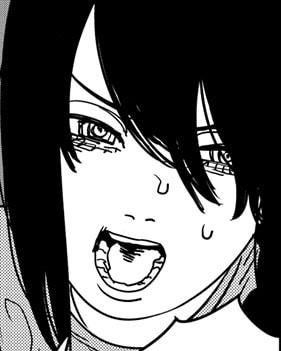
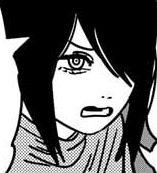

She really is just Power if she wasn't Racist. Okay- Listen- We don't have confirmation that Nayuta isn't racist. But she would have to pick that up herself since I doubt Denji would teach her to be racist because Denji isn't racist.
69 notes
·
View notes
Note
N and O? Hehe
Thanks for the ask!
N - Name three things you wish you saw more or in your main fandom (or a fandom of choice).
Oh, picking three things may be hard. For me it's really two things:
More stuff exploring the post-canon lives of as many characters as possible! I'm very biased towards Falin and her adventures around the world, but I'm also quite interested in what the life of characters life Namari and Holm will look, of several of the canaries after they leave prison, etc.
More stuff focussing on platonic relationships. I think there's several friendships that could be so interesting to explore post-canon: Holm and Kabru, Holm and Kuro, Tade and Izutsumi, Rin and Marcille. Kinda wanna see Rin interact with Namari or Kiki fsr lol. Oh and I'd love to see what people think an interaction between Kuro and Lycion could look like lol.
It'd also be interesting if more people took stuff from their cultures and re-imagined them as monsters. i received an ask a while ago that allowed me to look at youkai that may be interesting to eat, and it got me thinking, what monsters would exist in the rest of the world?
O - Choose a song at random. Which ship or character does it remind you of?
In my mind by Amanda Palmer
I could see it be a call back between Toshiro around his 20s and Toshiro at 26, the state he was in a little before, during and after the fight with Laios.
I think Toshiro's a character defined by how he's let the expectations of the type of person he was go be within his household define him to an extent that even he's started to resent, although I don't see he quite acknowledges that head-on. It's like he's on the cusp of the realization, perhaps intuitively he feels it, but there are still a couple steps he's gotta walk in the personal growth + maturity stairs before the penny drops.
So a Toshiro like that, talking to himself when he's a little younger. Not his childhood self since children only have so much agency when it comes to the construction of their identity, but a little older, when you have enough knowledge of the actions you can take to be a certain type of person. An age when Toshiro just decided he wasn't even going to choose, consciously committing to just doing what was expected of him.
(There's a meta-narrative discussion to have here regarding how much realistically he could've chosen differently, but I'm analyzing this song from the character's perspective. Toshiro's hinted to be quite hard on himself, perhaps lowkey a perfectionist, so I think he'd judge himself over not choosing to behave differently.)
And then, of course, Toshiro looks at the future:
And in my mind I imagine so many things Things that aren't really happening And when they put me in the ground I'll start pounding the lid Saying I haven't finished yet
I've been thinking that it'd be interesting to see him be confronted with the fear of death more directly. I've been thinking about this in regards to how he contrasts Namari?
Namari is so interesting to contrast with Toshiro because she quits to look after herself. She continues to do things related to finding Falin on the surface until enters the main story, but she puts herself first. She doesn't lend a helping hand until she's in a better place.
Quite the opposite to Toshiro, who had something to fall back on (his retainers) so he didn't have the same material concerns as Namari, and instead chose to stupidly neglect himself in the pursuit of the first goal he's had in his life.
Namari says "you must never forget your fear of death". I think Toshiro's not yet completely away that we're all here on borrowed time. And I think that maybe being confronted a bit with that memento mori would do him so good, may make him more proactive about living.
And it's funny how I imagined That I could win this, win this fight But maybe it isn't all that funny That I've been fighting all my life But maybe I have to think it's funny If I wanna live before I die And maybe it's funniest of all To think I'll die before I actually see That I am exactly the person that I want to be
This just fits so well, especially at the end. So he realizes life is finite and that's why you can't just let it pass you by, right?
It'd be nice if that came with a couple other realizations, like that he's been fighting a battle that can't be won (conforming perfectly to an archetype of person, performing some roles precisely as expected of him, etc) and that hey, maybe if you were a bit less passive you'd see you already are the person that you'd like to be, if you give it a chance.
5 notes
·
View notes
Note
also... penny for ur jodie thoughts ?
turns on immigrant song and sets it to loop. of course ^-^ I WAS GONNA DO A FRESH POST but i barely started typing it so i will answer on here instead! shout-out to @nutria--oscura as well because they also asked me for my jodie thoughts on my initial post
im gonna do a tl;dr as well as the full ramble, so! tl;dr first
canonically (in his fabricated human memories, not reality), jodie's mom, dee, was a singer and jodie didn't see her growing up because of this. i think the parallels to glenn here are obvious: glenn's dad, bill, was always on the road due to being a roadie/session musician, and dee was always on the road due to being a rock singer. the difference between them is that glenn spent consistent time with bill whenever bill wasn't busy, while jodie didn't (presumably he lived at home with his dad, but this isn't really clarified on), and i think this explains why they have such different adult lives despite their similar upbringings. glenn grew up involved in the rock scene, while jodie saw it more as something he could never be included in. however, once she appears in the podcast, dee is shown to be an extremely loving mother who has done everything in her power to find her son again, which is... really sweet, mostly, i love dee, but also its really sad because jodie has all these issues not from his actual life, but because he was used as some punishment against glenn for being a bad dad LMAO
now the full ramble with screenshots from the transcript and more headcanons/interpretations of how it affected him LOL
firstly, the part of the podcast that explains jodie's human memories, from SWAP (SWitched Ass Papas)


for simplicity's sake, for now, i'm gonna talk as if this is all true. we are taking jodie's human memories at face value.
jodie grew up without his mom in his life at all. i think "you never met her" was an exaggeration, based on the line "you don't have too many memories of them from your childhood", but she still is clearly not someone jodie spent much time with. her presence was always there, there were people in his life keeping him updated about her, he knew what she looked like, etc, but he didn't really know her. even when he did see her, jodie's memory is bad, he likely doesn't fully know what he experienced first-hand and what he was just told. it's a bit of ADHD projection, but i know that due to my memory problems, i've often had issues with being unsure what from my childhood was real and what was just something i made up. i think it's fair to say that jodie has similar issues based on these lines. he doesn't know his mom, she isn't a real person to him really, she's just this idea of a "cool mom" that was drilled into his head as a kid.
as i said, this parallels glenn's backstory in an interesting way. both bill and dee weren't home, but glenn still saw bill regularly. not a lot, but he always knew he would see bill again and generally considered him a positive influence in his upbringing (now, glenn's conflicting feelings about bill is a whole OTHER post i could write and have written before but-). okay tbh i was gonna get more in depth about bill and glenn's relationship but then i was rereading episode 29's transcript and started thinking too much and couldn't find any words, so we're just sticking with this screenshot from glenn close's damages:
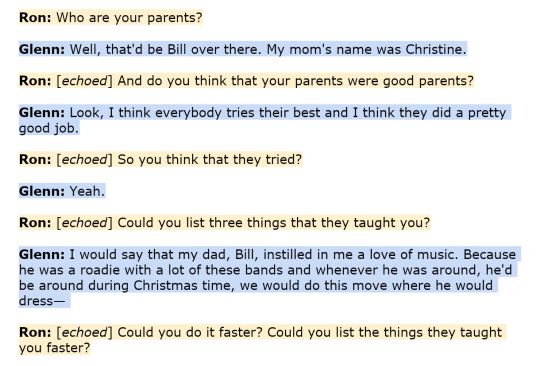
THE POINT I WAS MAKING BEFORE I SPACED OUT FOR 20 MINUTES THINKING ABOUT MY BABY GIRL BILL CLOSE. glenn got to spend time with his father and was often looped into his nonsense, which led glenn to being far more involved in the rock and roll scene. in contrast, jodie barely ever saw his mother, and its reasonable to extrapolate that that is why he went so far in the opposite direction as glenn. he rejected this world that his mom was a part of because if his mom didn't have any time for him, then that entire scene as a wider space didn't have any time for him either. jodie is shown to be a character that does not get over things: his deep yearning for morgan, his long-standing anger towards glenn, he doesn't know how to move past things that upset him. i think it's reasonable to assume his feelings towards his mom could fall into this group of long-held feelings. he is completely the type to throw himself into something rigid and consistent and soulless such as the police force to separate himself from his mom, who he's been told is a rock and roll singer who's cool and edgy.
and i think the reason why this makes me so sad is that it's completely... unnecessary might be the best word, because dee loves him.


dee absolutely adores jodie, she misses him, she did everything in her power to get him back to her. but as i said, jodie is a character that doesn't let things go. despite the way he says that he's a demon now, as if that eradicates his very human feelings, it's obvious that he never really got past his fabricated life - again, his desperate attachment to morgan is evidence of this. no matter how much his mom loves him, jodie is probably always going to have a part of him that looks at her as the human woman who abandoned him as a human child. and she didn't, she didn't at all, and isn't that just devastating?
i feel like there's so much more i could say, but it's already been an hour and a half since you sent this ask LMAO i just think, behind his pathetic exterior, jodie is an absolutely fascinating character and people often undervalue how devastating the back half of season one was for him. jodie is never going to be like, a good guy. i don't want to make people sympathize with him or anything, i get it, he's not a likeable person and i don't want him to be ♡♡ i love my bitchy pathetic demon king of hell ♡♡ but there's a lot more depth to him than people tend to sit down and think about
anyways do you guys think, pre-demon reveal in the jodie foster timeline, jodie just assumed the omega daddies didn't recruit his mom because they were misogynists
#jodie foster dndads#dndads#cookies over yonder#ask#sorry that this took over an hour to answer i was just having a lot of thoughts#can you guys imagine if i got the mental fortitude to update the dndads wiki#it would be This information may only appeal to a specific audience. tags all over the place
30 notes
·
View notes
Note
what's your favorite part of TGCF, and what about it do you like so much? ignore me if you've shared this before
omg it's been so long since you sent this ask, I am so sorry T_T I was really grateful to for you sending it, but stuff kept coming up and I simply did not have the emotional energy, and also did not want to give a half-hearted reply. that said I often struggle at articulating exactly why I like something, but I'll try!!
okay first thing that comes to mind when I think of why I like TGCF so much is that I really enjoy MXTX's writing style - of course, what I read was the English translation but I assume her style still comes across. I find the way the novel is written both very easy and very engaging to read. I was never bored and on the contrary had a really hard time putting down each volume so as not to read it all in one go. All the emotions came across really well, the novel succeeded both in making me laugh and making me cry. That's another thing I like about it, that with this story you get the whole range of comedy, action, romance, and horror. It's rare that a story manages to both incorporate and balance these at times contrasting aspects so well.
I also really liked how poetic the writing was at times, and how both philosophical and political concepts and ethics were woven into the plot and expressed through the characters.
Speaking of, I enjoyed all the characters so much. They're so well-rounded and feel so real, and there are so many interesting side characters. Jun Wu is a fantastic antagonist and Hualian are such an engaging pairing. I love both Xie Lian and Hua Cheng as individual characters as well as a couple - right from the start you can tell how much they simply enjoy each other's company, and their romance is just… it really moved my heart.
As for a favorite scene… there are so many!!! it's really hard to pick. I love Xie Lian meeting Hua Cheng “for the first time” at the beginning of the story and being so immediately intrigued with him, it's such a peak romantic encounter. I also love the reveal in the caves, even though (or because) parts of it are so heartbreaking, since it's rare to see Hua Cheng so vulnerable and emotional. I enjoy angsty moments like that a lot, I have to admit….
If I have to pick a single favorite moment, it'd be the battle between Hua Cheng and Jun Wu in Vol 8. First of all, super engaging fight scene, love that. Also epic as fuck!! like them fighting on top of The Heaven-Crossing Bridge that shakes every time their swords clash from how powerful the blows are while Hua Cheng's wraith butterflies face off against the vengeful spirits below? damn.
Then the delicious angst of Xie Lian being absolutely terrified for Hua Cheng, especially when Jun Wu starts to ruthlessly take advantage of Hua Cheng's disability*… and then it all culminating in Xie Lian still defying Jun Wu and sticking to what he's always known is right, and then ending in Hua Cheng's sacrifice, another peak romantic scene that had my heart race and made me cry so many tears. All of it exceeded my expectations for that final confrontation, I was just completely emotionally satisfied.
*Not gonna go into it here in detail since I've already posted it about several times and more in depth, but given the topic of this ask I can't not mention how intrigued I was by the way Hua Cheng navigates their world while disabled, the way he can compensate for it in some ways but not in others. It's a not insignificant part of why I love him as a character so much.
Last but not least the novel accompanied me all through last year and the beginning of this one and got me through some tough times. more than that, it made me take up meta and fanfic writing again after a long creative drought, and I will always look at it fondly and with gratitude for that.
hope this turned out a satisfying answer! what's your favorite part of the novel? :3c
8 notes
·
View notes